
VESSELS: Latin American Revolutionary Cinema with Ana Begoña Armengod
Celebrating the launch of Attensity!, the Strother School of Radical Attention (SoRA) holds a series of four participatory events where we will collectively create and test-drive vessels for human attention. Over the course of four weeks, four hosts will activate the Sanctuary Gallery in DUMBO with sound, film, objects and movement, and lecture performance.
This film screening and discussion session spotlights the radical attention adopted by makers and viewers of Latin American revolutionary film. We will view two full-length films and short excerpts of Tercer Cine (“Third Cinema”), a movement born in the late 1960s that urged cinema to catalyze collective action through direct dialogue with audiences and interrogations on filmmakers and critics’ positions in the cultural economy. We will explore questions like: how can the attentional modes of viewership and direct action work for each other? How can creators balance survival with subversive action? How can processes of film-making and viewing incorporate principles of collective action?
La Fórmula Secreta (Rubén Gámez – México, 1965) is a surrealist experimental film that uses symbolic and poetic imagery to explore Mexican identity and its crisis in the 1960s. It centers on the metaphor of a dying man injected with Coca-Cola in an attempt to revive him — an act that instead unleashes a furious cascade of dreamlike images invoking ancestral, colonial, "Hispanic", and modern myths that estrange Mexican subjectivity. Memorias del Subdesarrollo (Tomás Gutiérrez Alea – Cuba, 1968) follows Sergio, a bourgeois intellectual who chooses to remain in Cuba after the Revolution while his wife and friends emigrate to the United States. Through a fragmented narrative style that blends fiction with documentary footage, Sergio reflects on the island’s profound social and political changes between the Bay of Pigs invasion and the Missile Crisis.
Tercer Cine was coined by Argentinian filmmakers Fernando Solanas and Octavio Getino in their manifesto “Hacia al Tercer Cine (Towards a Third Cinema),” who called for the “transformation from mere entertainment into an active means of dealienation” beyond Hollywood (First Cinema) and European auteur cinema (Second Cinema). Its message has resonated beyond the 1960s and 1970s in Latin America into global cinema today.
Image: Ruben Gamez, La Fórmula Secreta, 1965, Mexico. Still image.
About the artist
Ana Begoña Armengod (Philadelphia, PA) is a Mexican multidisciplinary artist born in Mazatlán Sinaloa. Her art encompasses a wide range of mediums including film, illustration, writing, sculpture, installation, and sound. Her work is tied with nature and its death, as well as the small details that get lost in the bigger picture. Focused on accentuating the overlooked and unimportant, she gives magnitude to human reactions, history, emotion, and the environment while questioning how these things push us to evolve.
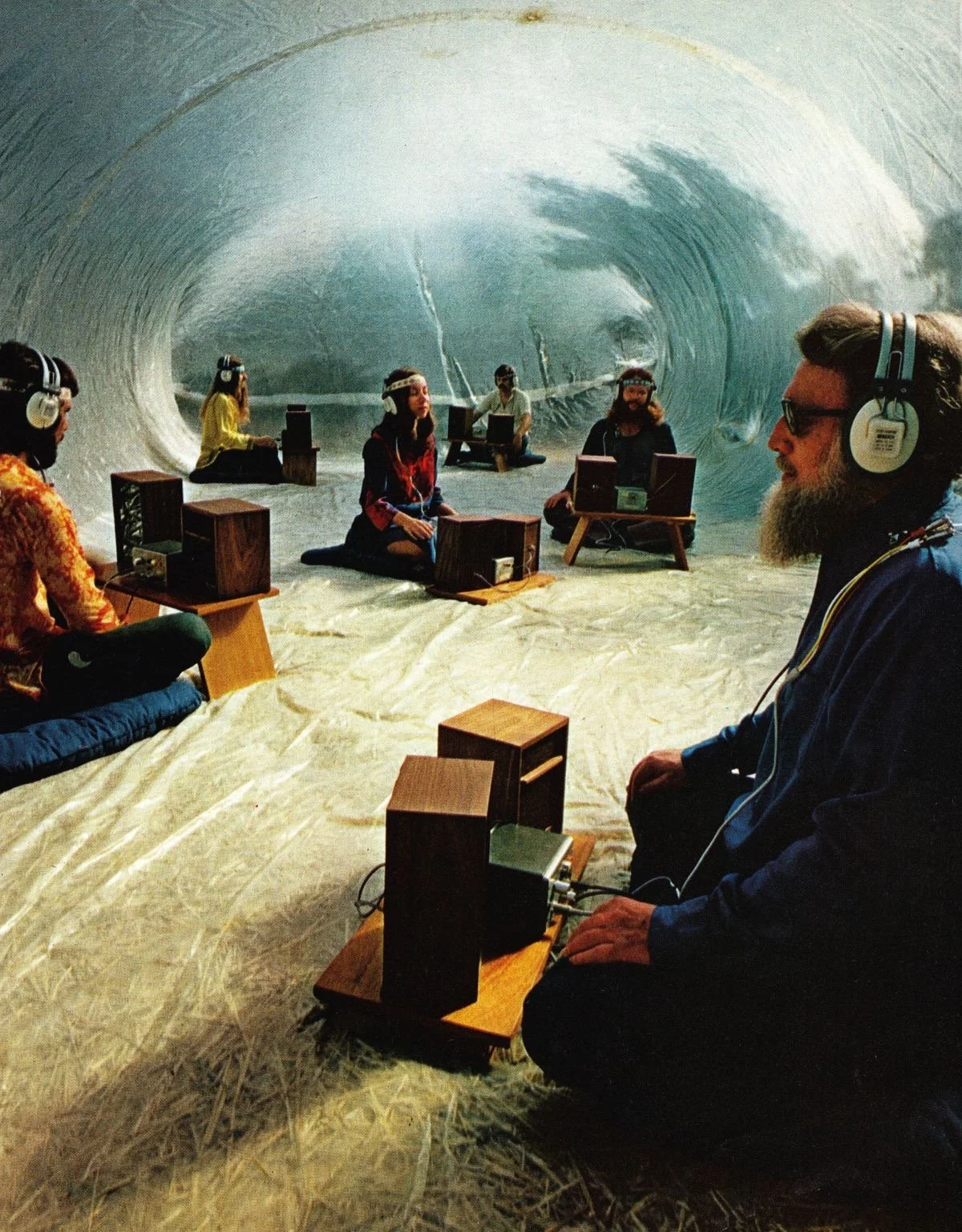
AMBIENT MUSIC (1/3)
Brian Eno famously claimed his 1979 album Music for Airports to be “as ignorable as it is interesting.” Eno was hardly the first to make music meant to create an environment rather than engage a listener. Telemann’s Musique de Table, Erik Satie’s “furniture music,” early 20th-century Muzak, and Japan’s 1980s “environmental music” all reveal a long lineage of composers using sound to contour experience—often unconsciously. What do these practices tell us about how sound organizes our sense of space and, as a result, our attention?
This course explores ambient music as a technology of attention. We’ll listen closely to how these works are constructed, how they unfold through time, and how they reorient (or disorient) our bodies and minds. What does music do when it isn’t asking to be “listened to”?
We’ll spend time with composers such as Brian Eno, Harold Budd, and Hiroshi Yoshimura, and students of all musical backgrounds (no experience necessary) will be invited to experiment with improvisation and composition using laptops, instruments, and voice.
Led by performance artist-composer Nicholas Miller and musician Julie Hill.
ENROLL HERE!

Sidewalk Study: THE RIPPLE & THE GRAVEL
No party lasts forever. How can an ephemeral gathering teach us something about eternity?
For this Study, we’ll read from Virginia Woolf’s To the Lighthouse, a modernist masterpiece that pierces the universal through the personal, expanding our perception of time and subjectivity. Our practice will focus specifically on the iconic dinner party scene, in which one of the central characters of the novel, Mrs. Ramsay, reaches a private epiphany about how to remain anchored amidst constantly shifting and unreliable circumstances.
Text: Virginia Woolf's To the Lighthouse
Date: Tue, Mar 3 • 7pm
Location: DUMBO with Hope and Ethan
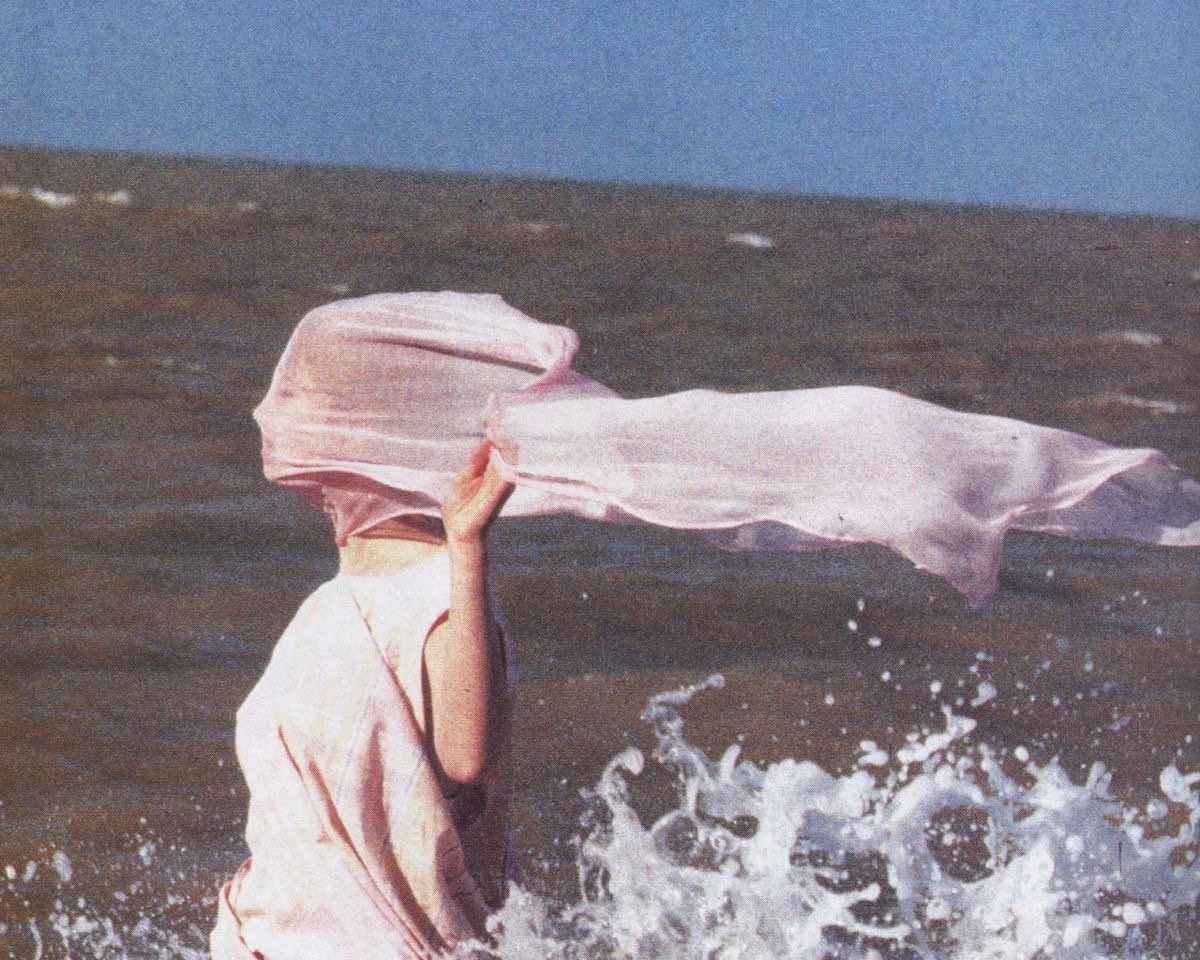
HOW to FLOURISH (3/3)
In an exploitative economy where our attention is constantly pulled, optimized, and commodified, many of us find ourselves living in survival mode—trying simply to avoid the habits and platforms that leave us drained. But is there a way to move beyond “not doing the bad stuff” and actually flourish in a culture that so often treats our attention as a resource to extract?
This seminar explores flourishing as a practice of attention rather than a goal. Drawing on thinkers like William James, Natasha Dow Schüll, Matthieu Ricard, and Dacher Keltner, as well as the newest psychological research on happiness, we'll look at how habits, technologies, emotions, the body, and the extent of our connection with others and the environment impact our quality of attention and, as a direct result, our quality of life.
We will leave this course with a rich and practical understanding of the psychology of flourishing and happiness, as well as concrete strategies to implement this understanding into our everyday lives.
Led by Maia Pujara, Assistant Professor of Psychology at Sarah Lawrence College.
![ATTENTION ACTIVISM 201 [ONLINE] (Session 3/3)](https://images.squarespace-cdn.com/content/v1/647e2e2c944dab371f654149/1761762662497-W61R3OUGOX8RUT19IQMR/Untitled+design+%281%29.png)
ATTENTION ACTIVISM 201 [ONLINE] (Session 3/3)
ATTENTION ACTIVISM is the collective movement to push back against the commodification of human attention — what we call "human fracking" — and create, space by community space, a world where we can flourish. In this training, we will explore practical strategies for ATTENTION ACTIVISM, drawing on texts by bell hooks, Paulo Freire, and Deva Woodly. In the 201 training, we will focus on developing the organizing, facilitation, and movement-building skills required to build groups for ATTENTION ACTIVISM. The bulk of the course will be dedicated to supporting participants toward an organizing project in their own communities.
Completion of our Attention Activism 101 seminar is required for participation in our 201 training. Participants who complete Attention Activism 201 will be eligible for inclusion in our national organizing coalition.
Wednesdays, 7-8:45pm EST
December 3, 10, and 17
On Zoom
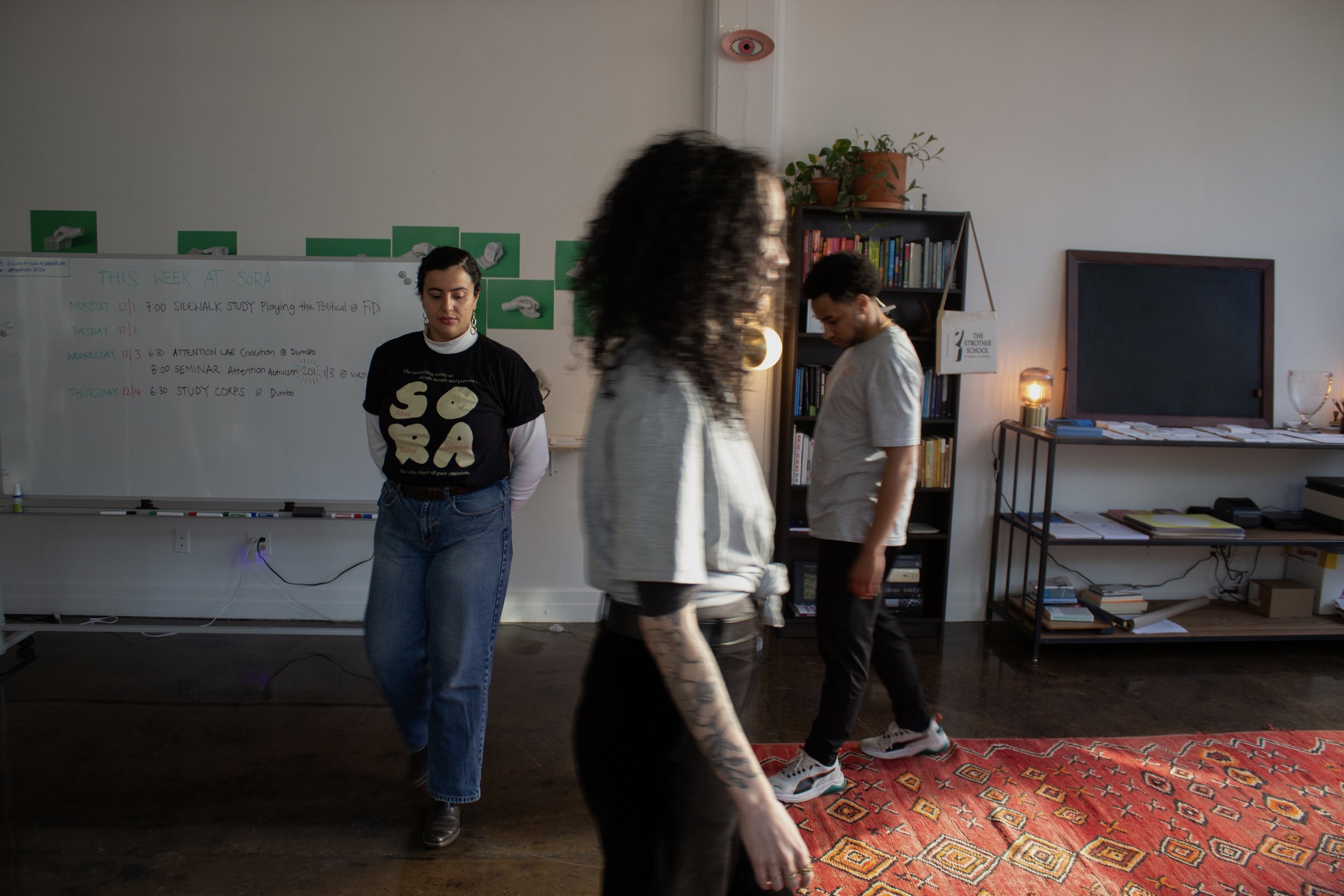
Attention Lab: STUDY
The Attention Labs are an experiential, participatory workshop curriculum dedicated to the joint exploration of radical human attention. Through group attention practices and guided discussions, we create and test tools to build sanctuaries of attention — as well as networks of solidarity to sustain them.
![ATTENTION ACTIVISM 101 [ONLINE] (Session 1/3)](https://images.squarespace-cdn.com/content/v1/647e2e2c944dab371f654149/1755618597294-KS67ESMC7FL8CZIBXMAX/Screenshot+2025-08-19+114824.png)
ATTENTION ACTIVISM 101 [ONLINE] (Session 1/3)
Attention is the touchstone problem of our age. Over the last twenty years, an unprecedented concentration of technical and financial power has successfully monetized human attention. The harms of this new system — in effect, the "fracking" of our most intimate selves — are familiar to all. Less widely understood is the nature of the movement that has emerged to fight back against this historic injustice: ATTENTION ACTIVISM.
In this course, we will survey the intellectual and practical foundations of the nascent ATTENTION ACTIVISM movement. We'll draw on texts by Karl Marx, Guy Debord, Shoshana Zuboff, Tim Wu, and Yves Citton among others. What do the extractive incursions of the Attention Economy mean for shared life in the twenty-first century — and how are communities of activists already working to resist them?

Exhibition Opening: On Loop with Public Domain Review
Celebrate with SoRA our first exhibition of the year at the Sanctuary Gallery, which features a collection of archival images guest-curated by Adam Green of Public Domain Review. Public Domain Review is an image archive exploring curious and compelling works from art history that have fallen into public domain. We will be offering a limited quantity of free postcards as well as posters for sale, featuring historical images on attention produced by Public Domain Review. We invite everyone to an informal letter-writing session for those who would like to share the thought-provoking images with loved ones.
This is a free event. Light refreshments will be provided.
Image courtesy of Public Domain Review and Adam Green. The Conjurer, painting from the workshop of Hieronymus Bosch, ca. 1510. The Yorck Project via Wikimedia Commons.

Sidewalk Study: RAVE!
The dance floor is a site of liberation and resistance: an attention sanctuary where DJ, dancer, music and movement commune; a meeting point between the intimate and the anonymous, the lasting and the fleeting. To rave is to evolve from consumer into co-creator. The DJ curates the conditions and the dancer is invited to blur boundaries between artist and audience.
In this Practice, we'll be reading excerpts from two books written about (and at the height of) rave culture. Join us in taking “the glory of rave” to the streets of Brooklyn.
Text: Brewster & Broughton's Last Night a DJ Saved My Life & Reynolds' Energy Flash
Date: Sat, Mar 7 • 7pm
Location: Bushwick with Eleanor & Marcella

Sidewalk Study: NEW RITUALS
Parties are a form of ritual — or can be. Since early history, rituals have been integral to how people come together. In this study, with the guidance of philosopher Byung-Chul Han, we’ll think about what constitutes a ritual, and how rituals appear and disappear from our contemporary lives.
Join us in close attention to the tea ceremony, the changing landscape of Chinatown, and the interplay between noise and silence that characterizes urban life. What might we regain by returning to ritual?
Text: Byung Chul-Han's The Disappearance of Rituals
Date: Sun, Mar 8 • 2pm
Location: Chinatown with Kyle & Cherilyn

AMBIENT MUSIC (2/3)
Brian Eno famously claimed his 1979 album Music for Airports to be “as ignorable as it is interesting.” Eno was hardly the first to make music meant to create an environment rather than engage a listener. Telemann’s Musique de Table, Erik Satie’s “furniture music,” early 20th-century Muzak, and Japan’s 1980s “environmental music” all reveal a long lineage of composers using sound to contour experience—often unconsciously. What do these practices tell us about how sound organizes our sense of space and, as a result, our attention?
This course explores ambient music as a technology of attention. We’ll listen closely to how these works are constructed, how they unfold through time, and how they reorient (or disorient) our bodies and minds. What does music do when it isn’t asking to be “listened to”?
We’ll spend time with composers such as Brian Eno, Harold Budd, and Hiroshi Yoshimura, and students of all musical backgrounds (no experience necessary) will be invited to experiment with improvisation and composition using laptops, instruments, and voice.
Led by performance artist-composer Nicholas Miller and musician Julie Hill.
![ATTENTION ACTIVISM 101 [ONLINE] (Session 1/3)](https://images.squarespace-cdn.com/content/v1/647e2e2c944dab371f654149/1755618597294-KS67ESMC7FL8CZIBXMAX/Screenshot+2025-08-19+114824.png)
ATTENTION ACTIVISM 101 [ONLINE] (Session 1/3)
Attention is the touchstone problem of our age. Over the last twenty years, an unprecedented concentration of technical and financial power has successfully monetized human attention. The harms of this new system — in effect, the "fracking" of our most intimate selves — are familiar to all. Less widely understood is the nature of the movement that has emerged to fight back against this historic injustice: ATTENTION ACTIVISM.
In this course, we will survey the intellectual and practical foundations of the nascent ATTENTION ACTIVISM movement. We'll draw on texts by Karl Marx, Guy Debord, Shoshana Zuboff, Tim Wu, and Yves Citton among others. What do the extractive incursions of the Attention Economy mean for shared life in the twenty-first century — and how are communities of activists already working to resist them?

Sidewalk Study: SECRET'S OUT!
A party can reveal the truth: with everyone in the same space at the same time, it's hard to prevent secrets from coming out.
In this Study, we'll read from a climactic party scene in Jane Austen's first novel, which narrates the coming-of-age of two sisters in the socially regulated milieu of eighteenth century England. We'll think about the kinds of attention that people give to other people at parties, and will play with the attention demanded by a dreaded truth irreversibly revealed.
Text: Jane Austen's Sense and Sensibility
Date: Mon, Feb 23 • 7pm
Location: Washington Square Park with Connor & Jonathan

COMPLEXITY (1/3)
A complex system is neither chaotic nor ordered—it is both at once. How do complex systems shape our attention? What kinds of attention help us sense, navigate, and participate in them?
This seminar explores complexity as a lens with which to look at a world caught between the “chaos” of AI slop, polarized discourse, and narrative collapse, and the “order” of authoritarian politics, corporate conformity, and techno-optimized efficiency. What “third way” can one savvy in complexity find through this impossible forest?
Through readings, discussion, and hands-on experiments—and guided by thinkers like Neil Theise, Nora Bateson, and James P. Carse—we’ll address these questions as we give close attention to complex systems. We will see how concepts like emergence, feedback, and interdependence are all key to understanding our experience of this (often overwhelmingly) complex moment. Along the way, we’ll consider how a lens of complexity, as Cybernetician Norbert Wiener put it, can help us “pursue the uphill battle against the prevailing tendency towards the commonplace and banal.”
Led by writer and media theorist Anna Beth Lane.
ENROLL HERE!
![ATTENTION ACTIVISM 101 [ONLINE] (Session 2/3)](https://images.squarespace-cdn.com/content/v1/647e2e2c944dab371f654149/1755618597294-KS67ESMC7FL8CZIBXMAX/Screenshot+2025-08-19+114824.png)
ATTENTION ACTIVISM 101 [ONLINE] (Session 2/3)
Attention is the touchstone problem of our age. Over the last twenty years, an unprecedented concentration of technical and financial power has successfully monetized human attention. The harms of this new system — in effect, the "fracking" of our most intimate selves — are familiar to all. Less widely understood is the nature of the movement that has emerged to fight back against this historic injustice: ATTENTION ACTIVISM.
In this course, we will survey the intellectual and practical foundations of the nascent ATTENTION ACTIVISM movement. We'll draw on texts by Karl Marx, Guy Debord, Shoshana Zuboff, Tim Wu, and Yves Citton among others. What do the extractive incursions of the Attention Economy mean for shared life in the twenty-first century — and how are communities of activists already working to resist them?

Sidewalk Study: SMALL TALK
Have you ever found yourself standing at the edge of a party, drink in hand, struggling to make idle conversation with a stranger? We often think of small talk as something that simply fills the space, as an uncomfortable exchange that postpones the even greater discomfort of silence.
But what happens if we embrace the banality and awkwardness of small talk? Can anything extraordinary be disclosed by shared attention to the mundane? We'll gather in Greenwich Village to study and practice these questions — and to see whether small talk can open the door to something bigger.
Text: velvetnoise's The Key to Love is Understanding
Date: Thu, Mar 12 • 7pm
Location: Greenwich Village with Richard & Samvit
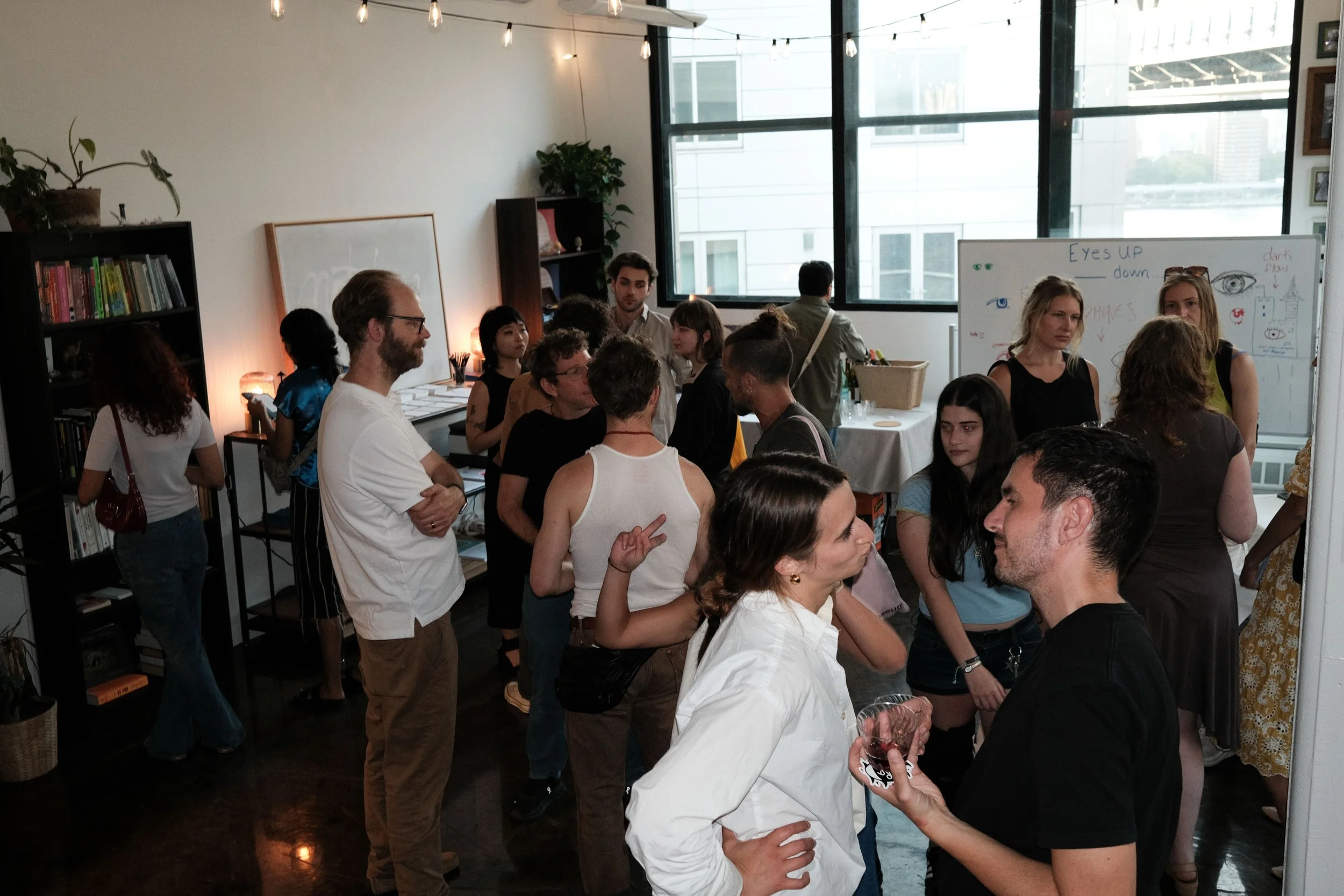
Attention Lab: SANCTUARY
The Attention Labs are an experiential, participatory workshop curriculum dedicated to the joint exploration of radical human attention. Through group attention practices and guided discussions, we create and test tools to build sanctuaries of attention — as well as networks of solidarity to sustain them.

AMBIENT MUSIC (3/3)
Brian Eno famously claimed his 1979 album Music for Airports to be “as ignorable as it is interesting.” Eno was hardly the first to make music meant to create an environment rather than engage a listener. Telemann’s Musique de Table, Erik Satie’s “furniture music,” early 20th-century Muzak, and Japan’s 1980s “environmental music” all reveal a long lineage of composers using sound to contour experience—often unconsciously. What do these practices tell us about how sound organizes our sense of space and, as a result, our attention?
This course explores ambient music as a technology of attention. We’ll listen closely to how these works are constructed, how they unfold through time, and how they reorient (or disorient) our bodies and minds. What does music do when it isn’t asking to be “listened to”?
We’ll spend time with composers such as Brian Eno, Harold Budd, and Hiroshi Yoshimura, and students of all musical backgrounds (no experience necessary) will be invited to experiment with improvisation and composition using laptops, instruments, and voice.
Led by performance artist-composer Nicholas Miller and musician Julie Hill.
![ATTENTION ACTIVISM 101 [ONLINE] (Session 2/3)](https://images.squarespace-cdn.com/content/v1/647e2e2c944dab371f654149/1755618597294-KS67ESMC7FL8CZIBXMAX/Screenshot+2025-08-19+114824.png)
ATTENTION ACTIVISM 101 [ONLINE] (Session 2/3)
Attention is the touchstone problem of our age. Over the last twenty years, an unprecedented concentration of technical and financial power has successfully monetized human attention. The harms of this new system — in effect, the "fracking" of our most intimate selves — are familiar to all. Less widely understood is the nature of the movement that has emerged to fight back against this historic injustice: ATTENTION ACTIVISM.
In this course, we will survey the intellectual and practical foundations of the nascent ATTENTION ACTIVISM movement. We'll draw on texts by Karl Marx, Guy Debord, Shoshana Zuboff, Tim Wu, and Yves Citton among others. What do the extractive incursions of the Attention Economy mean for shared life in the twenty-first century — and how are communities of activists already working to resist them?
![ATTENTION ACTIVISM 201 [ONLINE] (Session 1/3)](https://images.squarespace-cdn.com/content/v1/647e2e2c944dab371f654149/1761762662497-W61R3OUGOX8RUT19IQMR/Untitled+design+%281%29.png)
ATTENTION ACTIVISM 201 [ONLINE] (Session 1/3)
ATTENTION ACTIVISM is the collective movement to push back against the commodification of human attention — what we call "human fracking" — and create, space by community space, a world where we can flourish. In this training, we will explore practical strategies for ATTENTION ACTIVISM, drawing on texts by bell hooks, Paulo Freire, and Deva Woodly. In the 201 training, we will focus on developing the organizing, facilitation, and movement-building skills required to build groups for ATTENTION ACTIVISM. The bulk of the course will be dedicated to supporting participants toward an organizing project in their own communities.
Completion of our Attention Activism 101 seminar is required for participation in our 201 training. Participants who complete Attention Activism 201 will be eligible for inclusion in our national organizing coalition.
Wednesdays, 7-8:45pm EST
December 3, 10, and 17
On Zoom

COMPLEXITY (2/3)
A complex system is neither chaotic nor ordered—it is both at once. How do complex systems shape our attention? What kinds of attention help us sense, navigate, and participate in them?
This seminar explores complexity as a lens with which to look at a world caught between the “chaos” of AI slop, polarized discourse, and narrative collapse, and the “order” of authoritarian politics, corporate conformity, and techno-optimized efficiency. What “third way” can one savvy in complexity find through this impossible forest?
Through readings, discussion, and hands-on experiments—and guided by thinkers like Neil Theise, Nora Bateson, and James P. Carse—we’ll address these questions as we give close attention to complex systems. We will see how concepts like emergence, feedback, and interdependence are all key to understanding our experience of this (often overwhelmingly) complex moment. Along the way, we’ll consider how a lens of complexity, as Cybernetician Norbert Wiener put it, can help us “pursue the uphill battle against the prevailing tendency towards the commonplace and banal.”
Led by writer and media theorist Anna Beth Lane.
![ATTENTION ACTIVISM 101 [ONLINE] (Session 3/3)](https://images.squarespace-cdn.com/content/v1/647e2e2c944dab371f654149/1755618597294-KS67ESMC7FL8CZIBXMAX/Screenshot+2025-08-19+114824.png)
ATTENTION ACTIVISM 101 [ONLINE] (Session 3/3)
Attention is the touchstone problem of our age. Over the last twenty years, an unprecedented concentration of technical and financial power has successfully monetized human attention. The harms of this new system — in effect, the "fracking" of our most intimate selves — are familiar to all. Less widely understood is the nature of the movement that has emerged to fight back against this historic injustice: ATTENTION ACTIVISM.
In this course, we will survey the intellectual and practical foundations of the nascent ATTENTION ACTIVISM movement. We'll draw on texts by Karl Marx, Guy Debord, Shoshana Zuboff, Tim Wu, and Yves Citton among others. What do the extractive incursions of the Attention Economy mean for shared life in the twenty-first century — and how are communities of activists already working to resist them?
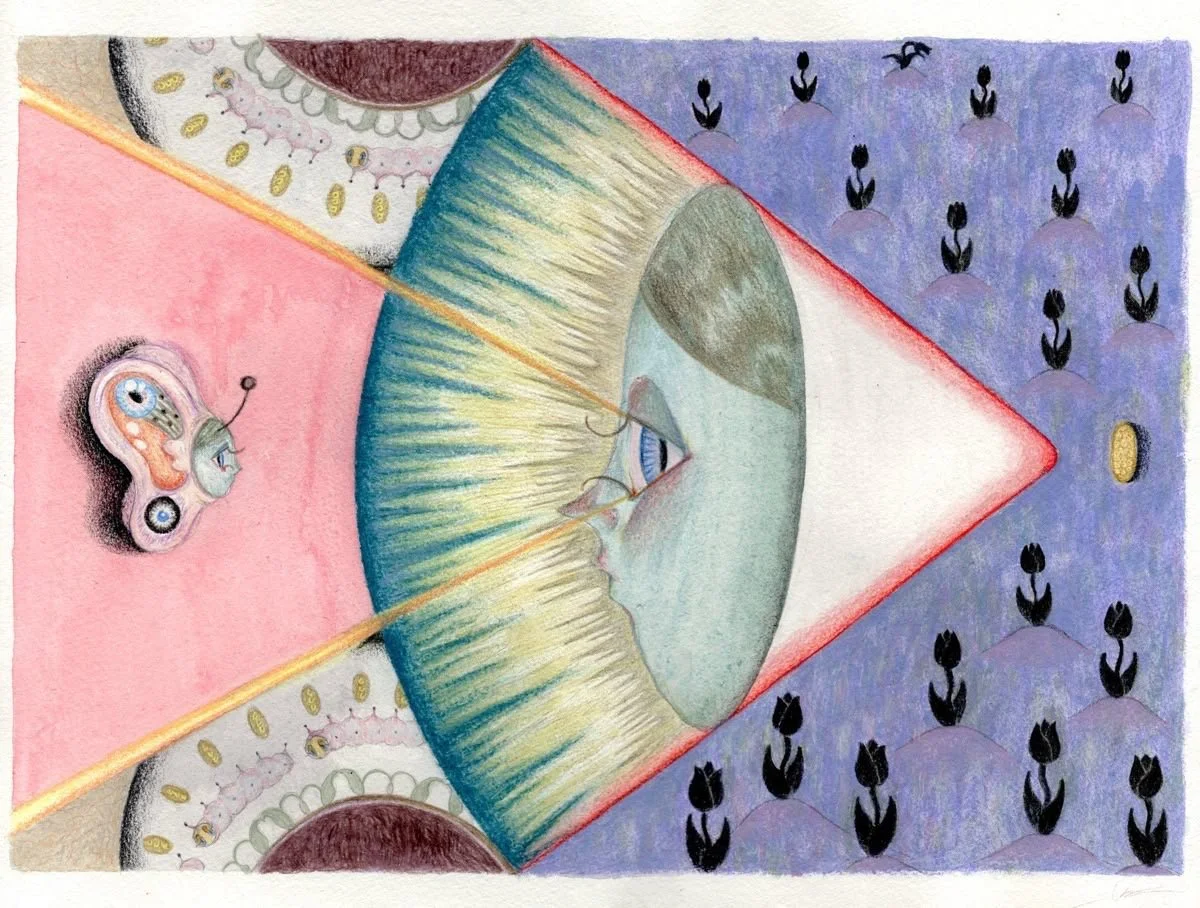
RADICAL IMAGINATION (1/3)
Diane di Prima writes: “The only war that matters is the war against the imagination. All other wars are subsumed in it.” If radical attentionis the reclaiming of those diverse forms of human attention that resist being commodified, then radical imagination is the reclaiming of our embodied human capacity to freely explore and experience possibility.
Like attention, imagination has come to be defined only by its most reductive and profit-generating forms. Rather than myths resonating with our unconscious lifeworld, we have Instagram “stories” activating our limbic system. In place of make-believe, we have photo filters and ready-made virtual realities. We open mindless, repetitive phone games and call that play. This is a crisis of the inner world: we are losing touch with our innate capacity to imagine and, therefore, to make change.
Drawing on the work of CG Jung, Ruha Benjamin, and William Blake among others, this course seeks to understand how we became alienated from this essential facet of our humanity and how we might enrich ourselves by its recovery. Our journey will take us from depth psychology and visionary poetry through theatrical improvisation and role-play, landing at last on workable strategies for a rebellion of the human imagination.
Led by Henry Kramer, Religious Studies professor at Hunter College and Academic Dean of SoRA.
ENROLL HERE!
![ATTENTION ACTIVISM 101 [ONLINE] (Session 3/3)](https://images.squarespace-cdn.com/content/v1/647e2e2c944dab371f654149/1755618597294-KS67ESMC7FL8CZIBXMAX/Screenshot+2025-08-19+114824.png)
ATTENTION ACTIVISM 101 [ONLINE] (Session 3/3)
Attention is the touchstone problem of our age. Over the last twenty years, an unprecedented concentration of technical and financial power has successfully monetized human attention. The harms of this new system — in effect, the "fracking" of our most intimate selves — are familiar to all. Less widely understood is the nature of the movement that has emerged to fight back against this historic injustice: ATTENTION ACTIVISM.
In this course, we will survey the intellectual and practical foundations of the nascent ATTENTION ACTIVISM movement. We'll draw on texts by Karl Marx, Guy Debord, Shoshana Zuboff, Tim Wu, and Yves Citton among others. What do the extractive incursions of the Attention Economy mean for shared life in the twenty-first century — and how are communities of activists already working to resist them?
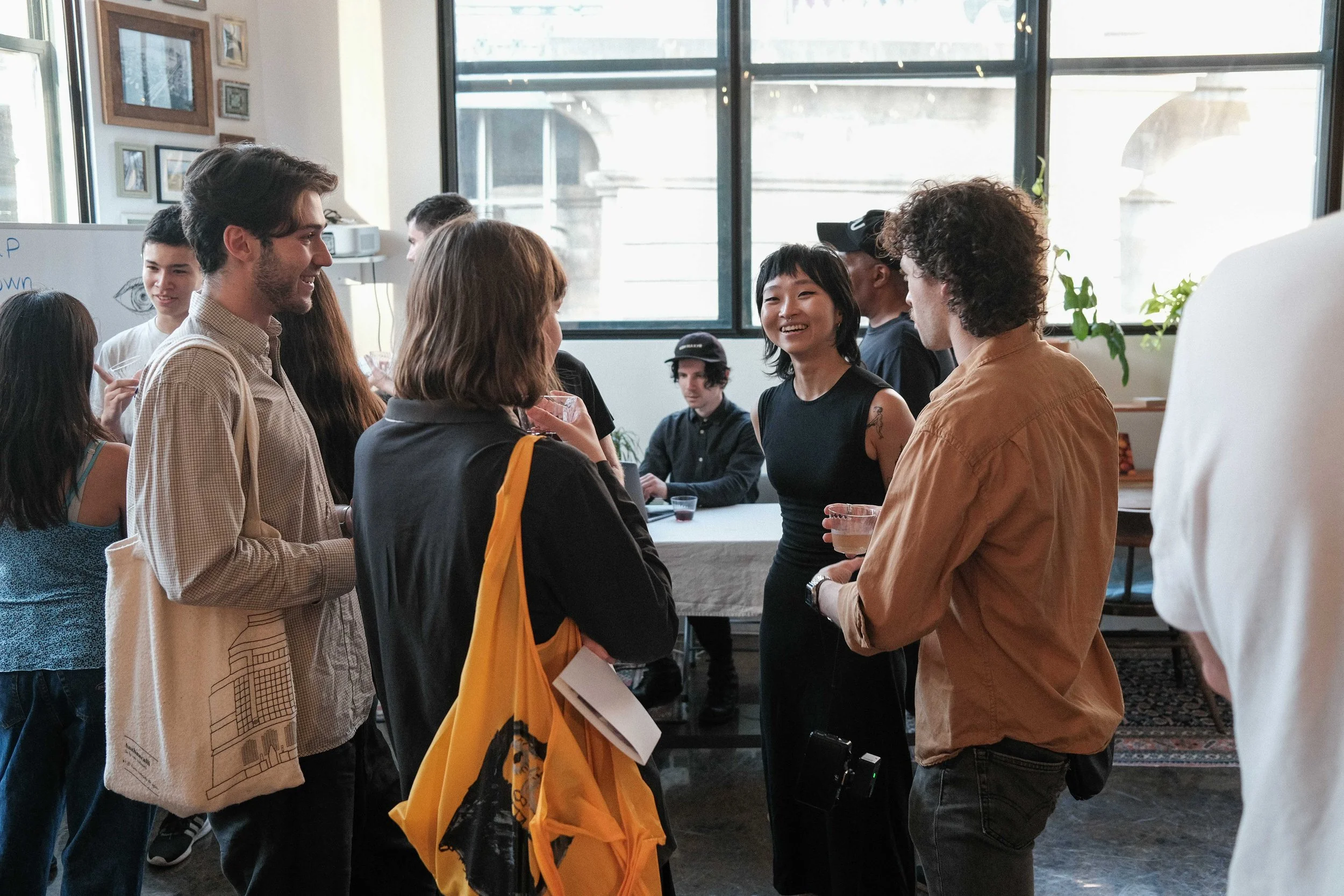
Attention Lab: COALITION
The Attention Labs are an experiential, participatory workshop curriculum dedicated to the joint exploration of radical human attention. Through group attention practices and guided discussions, we create and test tools to build sanctuaries of attention — as well as networks of solidarity to sustain them.
![ATTENTION ACTIVISM 201 [ONLINE] (Session 2/3)](https://images.squarespace-cdn.com/content/v1/647e2e2c944dab371f654149/1761762662497-W61R3OUGOX8RUT19IQMR/Untitled+design+%281%29.png)
ATTENTION ACTIVISM 201 [ONLINE] (Session 2/3)
ATTENTION ACTIVISM is the collective movement to push back against the commodification of human attention — what we call "human fracking" — and create, space by community space, a world where we can flourish. In this training, we will explore practical strategies for ATTENTION ACTIVISM, drawing on texts by bell hooks, Paulo Freire, and Deva Woodly. In the 201 training, we will focus on developing the organizing, facilitation, and movement-building skills required to build groups for ATTENTION ACTIVISM. The bulk of the course will be dedicated to supporting participants toward an organizing project in their own communities.
Completion of our Attention Activism 101 seminar is required for participation in our 201 training. Participants who complete Attention Activism 201 will be eligible for inclusion in our national organizing coalition.
Wednesdays, 7-8:45pm EST
December 3, 10, and 17
On Zoom

COMPLEXITY (3/3)
A complex system is neither chaotic nor ordered—it is both at once. How do complex systems shape our attention? What kinds of attention help us sense, navigate, and participate in them?
This seminar explores complexity as a lens with which to look at a world caught between the “chaos” of AI slop, polarized discourse, and narrative collapse, and the “order” of authoritarian politics, corporate conformity, and techno-optimized efficiency. What “third way” can one savvy in complexity find through this impossible forest?
Through readings, discussion, and hands-on experiments—and guided by thinkers like Neil Theise, Nora Bateson, and James P. Carse—we’ll address these questions as we give close attention to complex systems. We will see how concepts like emergence, feedback, and interdependence are all key to understanding our experience of this (often overwhelmingly) complex moment. Along the way, we’ll consider how a lens of complexity, as Cybernetician Norbert Wiener put it, can help us “pursue the uphill battle against the prevailing tendency towards the commonplace and banal.”
Led by writer and media theorist Anna Beth Lane.

RADICAL IMAGINATION (2/3)
Diane di Prima writes: “The only war that matters is the war against the imagination. All other wars are subsumed in it.” If radical attentionis the reclaiming of those diverse forms of human attention that resist being commodified, then radical imagination is the reclaiming of our embodied human capacity to freely explore and experience possibility.
Like attention, imagination has come to be defined only by its most reductive and profit-generating forms. Rather than myths resonating with our unconscious lifeworld, we have Instagram “stories” activating our limbic system. In place of make-believe, we have photo filters and ready-made virtual realities. We open mindless, repetitive phone games and call that play. This is a crisis of the inner world: we are losing touch with our innate capacity to imagine and, therefore, to make change.
Drawing on the work of CG Jung, Ruha Benjamin, and William Blake among others, this course seeks to understand how we became alienated from this essential facet of our humanity and how we might enrich ourselves by its recovery. Our journey will take us from depth psychology and visionary poetry through theatrical improvisation and role-play, landing at last on workable strategies for a rebellion of the human imagination.
Led by Henry Kramer, Religious Studies professor at Hunter College and Academic Dean of SoRA.
ENROLL HERE!
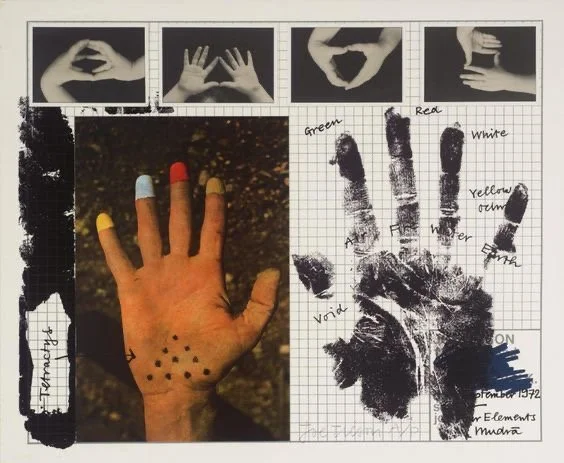
DOCUMENTING the DISAPPEARED (1/3)
What tools are available to the documentarian when cameras fail or are forbidden? How and what can we record when our subject is absent, inaccessible, or censored? More broadly: what does it mean to give our attention to someone or something we are told not to see?
We begin with the documentary—its forms, limits, and histories—and move toward the problem of how to document those who have been "disappeared" into our systems: individuals in carceral, psychiatric, or immigration detention spaces, and others rendered invisible by public policy, social stigma, or discriminatory law.
Through group discussions, film viewings, short readings, and hands-on experimentation, students will explore techniques such as negative space, sound, drawing, spatial observation, memory, and storytelling to expose the invisible subject. No prior filmmaking experience is required.
Led by filmmaker and Fulbright Fellow Andrea Sisson.
![ATTENTION ACTIVISM 201 [ONLINE] (Session 3/3)](https://images.squarespace-cdn.com/content/v1/647e2e2c944dab371f654149/1761762662497-W61R3OUGOX8RUT19IQMR/Untitled+design+%281%29.png)
ATTENTION ACTIVISM 201 [ONLINE] (Session 3/3)
ATTENTION ACTIVISM is the collective movement to push back against the commodification of human attention — what we call "human fracking" — and create, space by community space, a world where we can flourish. In this training, we will explore practical strategies for ATTENTION ACTIVISM, drawing on texts by bell hooks, Paulo Freire, and Deva Woodly. In the 201 training, we will focus on developing the organizing, facilitation, and movement-building skills required to build groups for ATTENTION ACTIVISM. The bulk of the course will be dedicated to supporting participants toward an organizing project in their own communities.
Completion of our Attention Activism 101 seminar is required for participation in our 201 training. Participants who complete Attention Activism 201 will be eligible for inclusion in our national organizing coalition.
Wednesdays, 7-8:45pm EST
December 3, 10, and 17
On Zoom

Attention Lab: STUDY
The Attention Labs are an experiential, participatory workshop curriculum dedicated to the joint exploration of radical human attention. Through group attention practices and guided discussions, we create and test tools to build sanctuaries of attention — as well as networks of solidarity to sustain them.
![ATTENTION ACTIVISM 101 [IN PERSON] (Session 1/3)](https://images.squarespace-cdn.com/content/v1/647e2e2c944dab371f654149/1755618597294-KS67ESMC7FL8CZIBXMAX/Screenshot+2025-08-19+114824.png)
ATTENTION ACTIVISM 101 [IN PERSON] (Session 1/3)
Attention is the touchstone problem of our age. Over the last twenty years, an unprecedented concentration of technical and financial power has successfully monetized human attention. The harms of this new system — in effect, the "fracking" of our most intimate selves — are familiar to all. Less widely understood is the nature of the movement that has emerged to fight back against this historic injustice: ATTENTION ACTIVISM.
In this course, we will survey the intellectual and practical foundations of the nascent ATTENTION ACTIVISM movement. We'll draw on texts by Karl Marx, Guy Debord, Shoshana Zuboff, Tim Wu, and Yves Citton among others. What do the extractive incursions of the Attention Economy mean for shared life in the twenty-first century — and how are communities of activists already working to resist them?

RADICAL IMAGINATION (3/3)
Diane di Prima writes: “The only war that matters is the war against the imagination. All other wars are subsumed in it.” If radical attentionis the reclaiming of those diverse forms of human attention that resist being commodified, then radical imagination is the reclaiming of our embodied human capacity to freely explore and experience possibility.
Like attention, imagination has come to be defined only by its most reductive and profit-generating forms. Rather than myths resonating with our unconscious lifeworld, we have Instagram “stories” activating our limbic system. In place of make-believe, we have photo filters and ready-made virtual realities. We open mindless, repetitive phone games and call that play. This is a crisis of the inner world: we are losing touch with our innate capacity to imagine and, therefore, to make change.
Drawing on the work of CG Jung, Ruha Benjamin, and William Blake among others, this course seeks to understand how we became alienated from this essential facet of our humanity and how we might enrich ourselves by its recovery. Our journey will take us from depth psychology and visionary poetry through theatrical improvisation and role-play, landing at last on workable strategies for a rebellion of the human imagination.
Led by Henry Kramer, Religious Studies professor at Hunter College and Academic Dean of SoRA.
ENROLL HERE!

DOCUMENTING the DISAPPEARED (2/3)
What tools are available to the documentarian when cameras fail or are forbidden? How and what can we record when our subject is absent, inaccessible, or censored? More broadly: what does it mean to give our attention to someone or something we are told not to see?
We begin with the documentary—its forms, limits, and histories—and move toward the problem of how to document those who have been "disappeared" into our systems: individuals in carceral, psychiatric, or immigration detention spaces, and others rendered invisible by public policy, social stigma, or discriminatory law.
Through group discussions, film viewings, short readings, and hands-on experimentation, students will explore techniques such as negative space, sound, drawing, spatial observation, memory, and storytelling to expose the invisible subject. No prior filmmaking experience is required.
Led by filmmaker and Fulbright Fellow Andrea Sisson.
![ATTENTION ACTIVISM 101 [ONLINE] (Session 1/3)](https://images.squarespace-cdn.com/content/v1/647e2e2c944dab371f654149/1755618597294-KS67ESMC7FL8CZIBXMAX/Screenshot+2025-08-19+114824.png)
ATTENTION ACTIVISM 101 [ONLINE] (Session 1/3)
Attention is the touchstone problem of our age. Over the last twenty years, an unprecedented concentration of technical and financial power has successfully monetized human attention. The harms of this new system — in effect, the "fracking" of our most intimate selves — are familiar to all. Less widely understood is the nature of the movement that has emerged to fight back against this historic injustice: ATTENTION ACTIVISM.
In this course, we will survey the intellectual and practical foundations of the nascent ATTENTION ACTIVISM movement. We'll draw on texts by Karl Marx, Guy Debord, Shoshana Zuboff, Tim Wu, and Yves Citton among others. What do the extractive incursions of the Attention Economy mean for shared life in the twenty-first century — and how are communities of activists already working to resist them?

Attention Lab: SANCTUARY
The Attention Labs are an experiential, participatory workshop curriculum dedicated to the joint exploration of radical human attention. Through group attention practices and guided discussions, we create and test tools to build sanctuaries of attention — as well as networks of solidarity to sustain them.
![ATTENTION ACTIVISM 101 [IN PERSON] (Session 2/3)](https://images.squarespace-cdn.com/content/v1/647e2e2c944dab371f654149/1755618597294-KS67ESMC7FL8CZIBXMAX/Screenshot+2025-08-19+114824.png)
ATTENTION ACTIVISM 101 [IN PERSON] (Session 2/3)
Attention is the touchstone problem of our age. Over the last twenty years, an unprecedented concentration of technical and financial power has successfully monetized human attention. The harms of this new system — in effect, the "fracking" of our most intimate selves — are familiar to all. Less widely understood is the nature of the movement that has emerged to fight back against this historic injustice: ATTENTION ACTIVISM.
In this course, we will survey the intellectual and practical foundations of the nascent ATTENTION ACTIVISM movement. We'll draw on texts by Karl Marx, Guy Debord, Shoshana Zuboff, Tim Wu, and Yves Citton among others. What do the extractive incursions of the Attention Economy mean for shared life in the twenty-first century — and how are communities of activists already working to resist them?
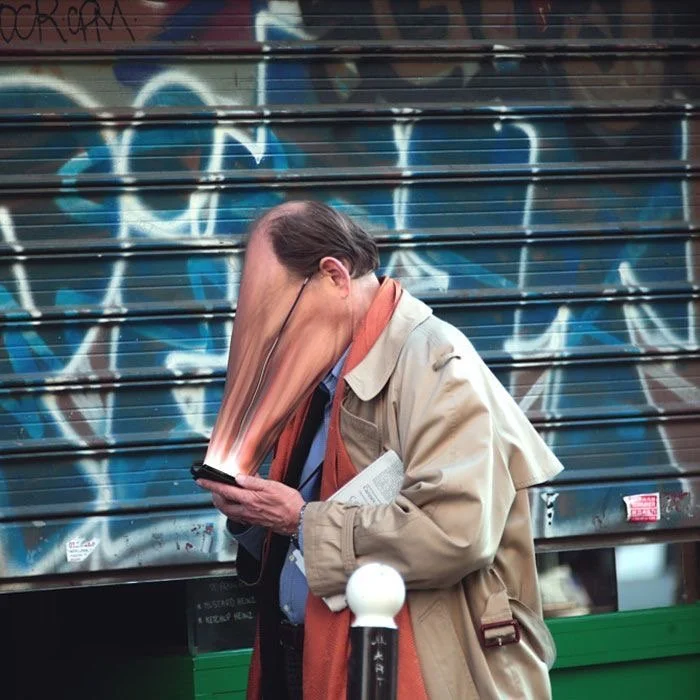
HYPNOTIC AUTONOMY (1/3)
We slip into trance constantly—doomscrolling, zoning out in meetings, losing track of time in the feed. Most of the trances we enter are engineered to harness our attention for someone else’s profit. But what if we learned to enter trance on purpose, to redirect that same faculty toward our own transformation?
This seminar treats hypnosis as a practice of attentional sovereignty: the deliberate use of focused awareness to create a state change in consciousness. Drawing from Daniel Siegel’s interpersonal neurobiology, Lisa Feldman-Barrett’s work on the brain, and Jonathan Gottschall’s concept of the "storytelling mind," we’ll consider critical perspectives on trance as a bodily, mystical, and relational phenomenon—a mode of perception through which the self becomes porous and new potentials more accessible.
Through guided exercises, demonstrations, and group practice, participants will critically situate hypnosis traditions within a broader cultural context, experience trance phenomena firsthand, and explore their uses for creativity and self-direction. Together we’ll ask: how might reclaiming our attention become an act of resistance—one that brings us closer to a world we choose?
Led by hypnosis educator Désirée Eckert.

DOCUMENTING the DISAPPEARED (3/3)
What tools are available to the documentarian when cameras fail or are forbidden? How and what can we record when our subject is absent, inaccessible, or censored? More broadly: what does it mean to give our attention to someone or something we are told not to see?
We begin with the documentary—its forms, limits, and histories—and move toward the problem of how to document those who have been "disappeared" into our systems: individuals in carceral, psychiatric, or immigration detention spaces, and others rendered invisible by public policy, social stigma, or discriminatory law.
Through group discussions, film viewings, short readings, and hands-on experimentation, students will explore techniques such as negative space, sound, drawing, spatial observation, memory, and storytelling to expose the invisible subject. No prior filmmaking experience is required.
Led by filmmaker and Fulbright Fellow Andrea Sisson.
![ATTENTION ACTIVISM 101 [ONLINE] (Session 2/3)](https://images.squarespace-cdn.com/content/v1/647e2e2c944dab371f654149/1755618597294-KS67ESMC7FL8CZIBXMAX/Screenshot+2025-08-19+114824.png)
ATTENTION ACTIVISM 101 [ONLINE] (Session 2/3)
Attention is the touchstone problem of our age. Over the last twenty years, an unprecedented concentration of technical and financial power has successfully monetized human attention. The harms of this new system — in effect, the "fracking" of our most intimate selves — are familiar to all. Less widely understood is the nature of the movement that has emerged to fight back against this historic injustice: ATTENTION ACTIVISM.
In this course, we will survey the intellectual and practical foundations of the nascent ATTENTION ACTIVISM movement. We'll draw on texts by Karl Marx, Guy Debord, Shoshana Zuboff, Tim Wu, and Yves Citton among others. What do the extractive incursions of the Attention Economy mean for shared life in the twenty-first century — and how are communities of activists already working to resist them?
![ATTENTION ACTIVISM 101 [IN PERSON] (Session 3/3)](https://images.squarespace-cdn.com/content/v1/647e2e2c944dab371f654149/1755618597294-KS67ESMC7FL8CZIBXMAX/Screenshot+2025-08-19+114824.png)
ATTENTION ACTIVISM 101 [IN PERSON] (Session 3/3)
Attention is the touchstone problem of our age. Over the last twenty years, an unprecedented concentration of technical and financial power has successfully monetized human attention. The harms of this new system — in effect, the "fracking" of our most intimate selves — are familiar to all. Less widely understood is the nature of the movement that has emerged to fight back against this historic injustice: ATTENTION ACTIVISM.
In this course, we will survey the intellectual and practical foundations of the nascent ATTENTION ACTIVISM movement. We'll draw on texts by Karl Marx, Guy Debord, Shoshana Zuboff, Tim Wu, and Yves Citton among others. What do the extractive incursions of the Attention Economy mean for shared life in the twenty-first century — and how are communities of activists already working to resist them?
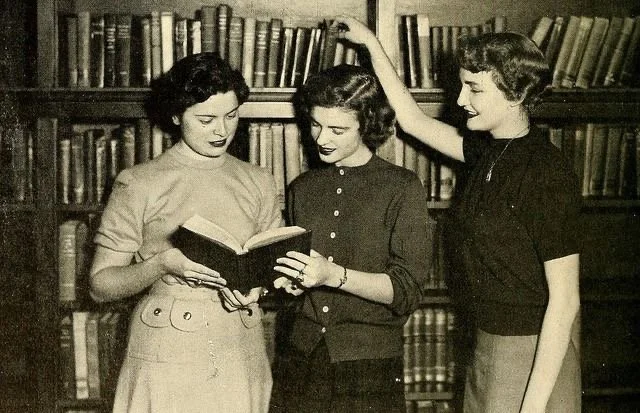
Attention Lab: COALITION
The Attention Labs are an experiential, participatory workshop curriculum dedicated to the joint exploration of radical human attention. Through group attention practices and guided discussions, we create and test tools to build sanctuaries of attention — as well as networks of solidarity to sustain them.

HYPNOTIC AUTONOMY (2/3)
We slip into trance constantly—doomscrolling, zoning out in meetings, losing track of time in the feed. Most of the trances we enter are engineered to harness our attention for someone else’s profit. But what if we learned to enter trance on purpose, to redirect that same faculty toward our own transformation?
This seminar treats hypnosis as a practice of attentional sovereignty: the deliberate use of focused awareness to create a state change in consciousness. Drawing from Daniel Siegel’s interpersonal neurobiology, Lisa Feldman-Barrett’s work on the brain, and Jonathan Gottschall’s concept of the "storytelling mind," we’ll consider critical perspectives on trance as a bodily, mystical, and relational phenomenon—a mode of perception through which the self becomes porous and new potentials more accessible.
Through guided exercises, demonstrations, and group practice, participants will critically situate hypnosis traditions within a broader cultural context, experience trance phenomena firsthand, and explore their uses for creativity and self-direction. Together we’ll ask: how might reclaiming our attention become an act of resistance—one that brings us closer to a world we choose?
Led by hypnosis educator Désirée Eckert.
![ATTENTION ACTIVISM 101 [ONLINE] (Session 3/3)](https://images.squarespace-cdn.com/content/v1/647e2e2c944dab371f654149/1755618597294-KS67ESMC7FL8CZIBXMAX/Screenshot+2025-08-19+114824.png)
ATTENTION ACTIVISM 101 [ONLINE] (Session 3/3)
Attention is the touchstone problem of our age. Over the last twenty years, an unprecedented concentration of technical and financial power has successfully monetized human attention. The harms of this new system — in effect, the "fracking" of our most intimate selves — are familiar to all. Less widely understood is the nature of the movement that has emerged to fight back against this historic injustice: ATTENTION ACTIVISM.
In this course, we will survey the intellectual and practical foundations of the nascent ATTENTION ACTIVISM movement. We'll draw on texts by Karl Marx, Guy Debord, Shoshana Zuboff, Tim Wu, and Yves Citton among others. What do the extractive incursions of the Attention Economy mean for shared life in the twenty-first century — and how are communities of activists already working to resist them?

ATTENTION and the EARTH (1/3)
In the 1960s, a broad coalition of activists responded to the mounting destruction of the natural environment with a slogan of ECOLOGY NOW!, the tagline for a political movement that recognized the material interdependence of human and non-human life. Now, in the 2020s, the rise of another extractive industry is driving a parallel paradigm shift, one concerned not with the "outer" environment of air and water, but with the "inner" environment of the mind and senses. Its rallying cry? ATTENSITY NOW!
This seminar positions human fracking and climate crisis as interrelated threats to human existence in the twenty-first century. To explore the material and metaphorical relationships between attention activism and environmental politics, we will draw on texts by Rob Nixon, Zadie Smith, Traci Brynne Voyles, and others. Through group discussions and practices, we'll seek to develop a vocabulary and framework for joint efforts at the nexus of attention activism and ecological repair.
Led by Peter Schmidt, writer and Program Director at the Strother School of Radical Attention.

HYPNOTIC AUTONOMY (3/3)
We slip into trance constantly—doomscrolling, zoning out in meetings, losing track of time in the feed. Most of the trances we enter are engineered to harness our attention for someone else’s profit. But what if we learned to enter trance on purpose, to redirect that same faculty toward our own transformation?
This seminar treats hypnosis as a practice of attentional sovereignty: the deliberate use of focused awareness to create a state change in consciousness. Drawing from Daniel Siegel’s interpersonal neurobiology, Lisa Feldman-Barrett’s work on the brain, and Jonathan Gottschall’s concept of the "storytelling mind," we’ll consider critical perspectives on trance as a bodily, mystical, and relational phenomenon—a mode of perception through which the self becomes porous and new potentials more accessible.
Through guided exercises, demonstrations, and group practice, participants will critically situate hypnosis traditions within a broader cultural context, experience trance phenomena firsthand, and explore their uses for creativity and self-direction. Together we’ll ask: how might reclaiming our attention become an act of resistance—one that brings us closer to a world we choose?
Led by hypnosis educator Désirée Eckert.

INTO the WEEDS (1/3)
In this course, we will embed ourselves in the “feral ecosystems” of New York City. Our topic of study will be WEEDS—the subversive plant life that grows on the outskirts of human attention and in spite of best efforts at their eradication.
We will take plant blindness—our cultural oversight of the diversity, mystery, and uniqueness of flora—as a starting point and an obstacle. Guided in our looking by the theoretical frameworks of Bruno Latour, Anna Tsing, Donna Haraway, and Robin Wall Kimmerer, we’ll let these “unwanted” species become our guides to the city’s overlooked ecologies. What happens when we shift our awareness toward medicinal mugwort pushing up through sidewalk seams, burdock hooking itself to our clothes, or Japanese knotweed weaving across the borders set by chain-link fences? How might these plants, often dismissed as invaders or nuisances, teach us about adaptive intelligence, survival, and reciprocity and become partners in imagining multispecies urban futures?
Through fieldwork, roundtable discussions, and collaborative art making, we’ll experiment with reclaiming forms of embodied noticing. Our time together will culminate in a collaborative urban-weed field guide that invites students to translate attention into intimacy, rendering these feral companions as thriving co-inhabitants of our stories, our health, and our shared futures.
Led by educator Isabelle Groenewegen and artist-organizer Amy Pekal.

ATTENTION and the EARTH (2/3)
In the 1960s, a broad coalition of activists responded to the mounting destruction of the natural environment with a slogan of ECOLOGY NOW!, the tagline for a political movement that recognized the material interdependence of human and non-human life. Now, in the 2020s, the rise of another extractive industry is driving a parallel paradigm shift, one concerned not with the "outer" environment of air and water, but with the "inner" environment of the mind and senses. Its rallying cry? ATTENSITY NOW!
This seminar positions human fracking and climate crisis as interrelated threats to human existence in the twenty-first century. To explore the material and metaphorical relationships between attention activism and environmental politics, we will draw on texts by Rob Nixon, Zadie Smith, Traci Brynne Voyles, and others. Through group discussions and practices, we'll seek to develop a vocabulary and framework for joint efforts at the nexus of attention activism and ecological repair.
Led by Peter Schmidt, writer and Program Director at the Strother School of Radical Attention.
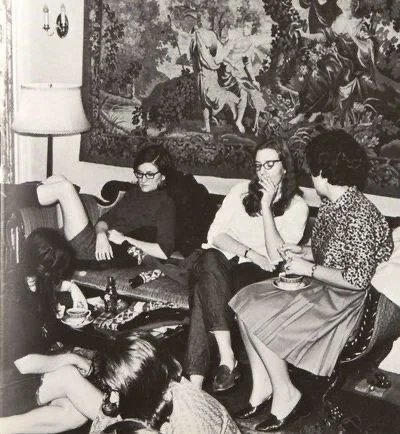
Attention Lab: STUDY
The Attention Labs are an experiential, participatory workshop curriculum dedicated to the joint exploration of radical human attention. Through group attention practices and guided discussions, we create and test tools to build sanctuaries of attention — as well as networks of solidarity to sustain them.

INTO the WEEDS (2/3)
In this course, we will embed ourselves in the “feral ecosystems” of New York City. Our topic of study will be WEEDS—the subversive plant life that grows on the outskirts of human attention and in spite of best efforts at their eradication.
We will take plant blindness—our cultural oversight of the diversity, mystery, and uniqueness of flora—as a starting point and an obstacle. Guided in our looking by the theoretical frameworks of Bruno Latour, Anna Tsing, Donna Haraway, and Robin Wall Kimmerer, we’ll let these “unwanted” species become our guides to the city’s overlooked ecologies. What happens when we shift our awareness toward medicinal mugwort pushing up through sidewalk seams, burdock hooking itself to our clothes, or Japanese knotweed weaving across the borders set by chain-link fences? How might these plants, often dismissed as invaders or nuisances, teach us about adaptive intelligence, survival, and reciprocity and become partners in imagining multispecies urban futures?
Through fieldwork, roundtable discussions, and collaborative art making, we’ll experiment with reclaiming forms of embodied noticing. Our time together will culminate in a collaborative urban-weed field guide that invites students to translate attention into intimacy, rendering these feral companions as thriving co-inhabitants of our stories, our health, and our shared futures.
Led by educator Isabelle Groenewegen and artist-organizer Amy Pekal.

ATTENTION and the EARTH (3/3)
In the 1960s, a broad coalition of activists responded to the mounting destruction of the natural environment with a slogan of ECOLOGY NOW!, the tagline for a political movement that recognized the material interdependence of human and non-human life. Now, in the 2020s, the rise of another extractive industry is driving a parallel paradigm shift, one concerned not with the "outer" environment of air and water, but with the "inner" environment of the mind and senses. Its rallying cry? ATTENSITY NOW!
This seminar positions human fracking and climate crisis as interrelated threats to human existence in the twenty-first century. To explore the material and metaphorical relationships between attention activism and environmental politics, we will draw on texts by Rob Nixon, Zadie Smith, Traci Brynne Voyles, and others. Through group discussions and practices, we'll seek to develop a vocabulary and framework for joint efforts at the nexus of attention activism and ecological repair.
Led by Peter Schmidt, writer and Program Director at the Strother School of Radical Attention.
![ATTENTION ACTIVISM 101 [ONLINE] (Session 1/3)](https://images.squarespace-cdn.com/content/v1/647e2e2c944dab371f654149/1755618597294-KS67ESMC7FL8CZIBXMAX/Screenshot+2025-08-19+114824.png)
ATTENTION ACTIVISM 101 [ONLINE] (Session 1/3)
Attention is the touchstone problem of our age. Over the last twenty years, an unprecedented concentration of technical and financial power has successfully monetized human attention. The harms of this new system — in effect, the "fracking" of our most intimate selves — are familiar to all. Less widely understood is the nature of the movement that has emerged to fight back against this historic injustice: ATTENTION ACTIVISM.
In this course, we will survey the intellectual and practical foundations of the nascent ATTENTION ACTIVISM movement. We'll draw on texts by Karl Marx, Guy Debord, Shoshana Zuboff, Tim Wu, and Yves Citton among others. What do the extractive incursions of the Attention Economy mean for shared life in the twenty-first century — and how are communities of activists already working to resist them?

INTO the WEEDS (3/3)
In this course, we will embed ourselves in the “feral ecosystems” of New York City. Our topic of study will be WEEDS—the subversive plant life that grows on the outskirts of human attention and in spite of best efforts at their eradication.
We will take plant blindness—our cultural oversight of the diversity, mystery, and uniqueness of flora—as a starting point and an obstacle. Guided in our looking by the theoretical frameworks of Bruno Latour, Anna Tsing, Donna Haraway, and Robin Wall Kimmerer, we’ll let these “unwanted” species become our guides to the city’s overlooked ecologies. What happens when we shift our awareness toward medicinal mugwort pushing up through sidewalk seams, burdock hooking itself to our clothes, or Japanese knotweed weaving across the borders set by chain-link fences? How might these plants, often dismissed as invaders or nuisances, teach us about adaptive intelligence, survival, and reciprocity and become partners in imagining multispecies urban futures?
Through fieldwork, roundtable discussions, and collaborative art making, we’ll experiment with reclaiming forms of embodied noticing. Our time together will culminate in a collaborative urban-weed field guide that invites students to translate attention into intimacy, rendering these feral companions as thriving co-inhabitants of our stories, our health, and our shared futures.
Led by educator Isabelle Groenewegen and artist-organizer Amy Pekal.
![ATTENTION ACTIVISM 101 [ONLINE] (Session 2/3)](https://images.squarespace-cdn.com/content/v1/647e2e2c944dab371f654149/1755618597294-KS67ESMC7FL8CZIBXMAX/Screenshot+2025-08-19+114824.png)
ATTENTION ACTIVISM 101 [ONLINE] (Session 2/3)
Attention is the touchstone problem of our age. Over the last twenty years, an unprecedented concentration of technical and financial power has successfully monetized human attention. The harms of this new system — in effect, the "fracking" of our most intimate selves — are familiar to all. Less widely understood is the nature of the movement that has emerged to fight back against this historic injustice: ATTENTION ACTIVISM.
In this course, we will survey the intellectual and practical foundations of the nascent ATTENTION ACTIVISM movement. We'll draw on texts by Karl Marx, Guy Debord, Shoshana Zuboff, Tim Wu, and Yves Citton among others. What do the extractive incursions of the Attention Economy mean for shared life in the twenty-first century — and how are communities of activists already working to resist them?
![ATTENTION ACTIVISM 101 [ONLINE] (Session 3/3)](https://images.squarespace-cdn.com/content/v1/647e2e2c944dab371f654149/1755618597294-KS67ESMC7FL8CZIBXMAX/Screenshot+2025-08-19+114824.png)
ATTENTION ACTIVISM 101 [ONLINE] (Session 3/3)
Attention is the touchstone problem of our age. Over the last twenty years, an unprecedented concentration of technical and financial power has successfully monetized human attention. The harms of this new system — in effect, the "fracking" of our most intimate selves — are familiar to all. Less widely understood is the nature of the movement that has emerged to fight back against this historic injustice: ATTENTION ACTIVISM.
In this course, we will survey the intellectual and practical foundations of the nascent ATTENTION ACTIVISM movement. We'll draw on texts by Karl Marx, Guy Debord, Shoshana Zuboff, Tim Wu, and Yves Citton among others. What do the extractive incursions of the Attention Economy mean for shared life in the twenty-first century — and how are communities of activists already working to resist them?
![ATTENTION ACTIVISM 201 [ONLINE] (Session 2/3)](https://images.squarespace-cdn.com/content/v1/647e2e2c944dab371f654149/1761762662497-W61R3OUGOX8RUT19IQMR/Untitled+design+%281%29.png)
ATTENTION ACTIVISM 201 [ONLINE] (Session 2/3)
ATTENTION ACTIVISM is the collective movement to push back against the commodification of human attention — what we call "human fracking" — and create, space by community space, a world where we can flourish. In this training, we will explore practical strategies for ATTENTION ACTIVISM, drawing on texts by bell hooks, Paulo Freire, and Deva Woodly. In the 201 training, we will focus on developing the organizing, facilitation, and movement-building skills required to build groups for ATTENTION ACTIVISM. The bulk of the course will be dedicated to supporting participants toward an organizing project in their own communities.
Completion of our Attention Activism 101 seminar is required for participation in our 201 training. Participants who complete Attention Activism 201 will be eligible for inclusion in our national organizing coalition.
Wednesdays, 7-8:45pm EST
December 3, 10, and 17
On Zoom

HOW to FLOURISH (2/3)
In an exploitative economy where our attention is constantly pulled, optimized, and commodified, many of us find ourselves living in survival mode—trying simply to avoid the habits and platforms that leave us drained. But is there a way to move beyond “not doing the bad stuff” and actually flourish in a culture that so often treats our attention as a resource to extract?
This seminar explores flourishing as a practice of attention rather than a goal. Drawing on thinkers like William James, Natasha Dow Schüll, Matthieu Ricard, and Dacher Keltner, as well as the newest psychological research on happiness, we'll look at how habits, technologies, emotions, the body, and the extent of our connection with others and the environment impact our quality of attention and, as a direct result, our quality of life.
We will leave this course with a rich and practical understanding of the psychology of flourishing and happiness, as well as concrete strategies to implement this understanding into our everyday lives.
Led by Maia Pujara, Assistant Professor of Psychology at Sarah Lawrence College.
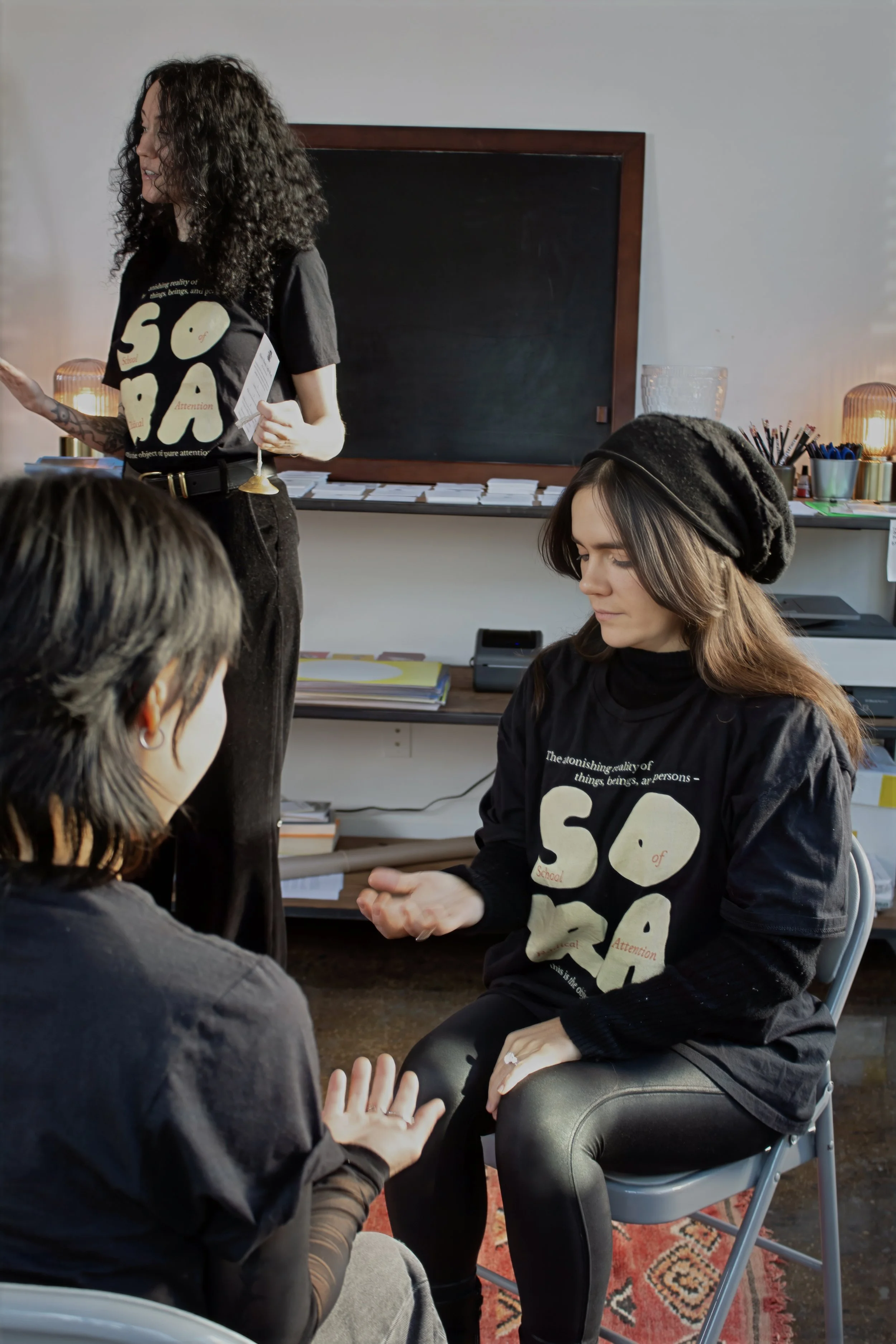
Attention Lab: COALITION
The Attention Labs are an experiential, participatory workshop curriculum dedicated to the joint exploration of radical human attention. Through group attention practices and guided discussions, we create and test tools to build sanctuaries of attention — as well as networks of solidarity to sustain them.
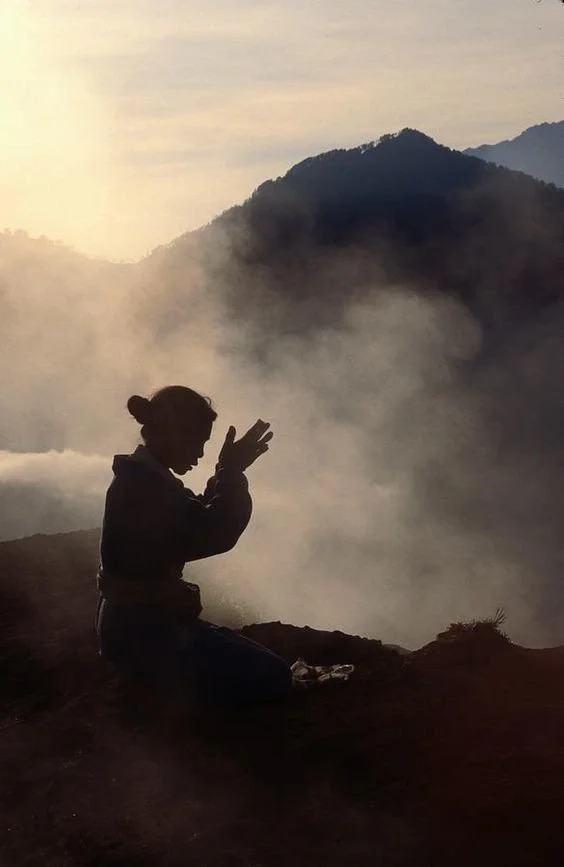
ATTENTION as PRAYER (3/3)
Mary Oliver once confessed, “I don’t know what a prayer is. I do know how to pay attention.” Are we sure prayer and attention are so different? Simone Weil, the French philosopher and mystic, wrote that prayer is “the orientation of all the attention of which the soul is capable toward God,” and that “the quality of the attention counts for much in the quality of prayer.”
This seminar takes Weil’s challenge seriously. We will exercise attention through the close reading of prayerful writing from the Catholic, Jewish, and Muslim traditions—from the ecstatic Sufi poetry of Rumi and Hafez to the contemplative philosophy of Martin Buber and Franz Kafka. We will attend closely to the language that creates and sustains the pursuit of divine connection through a variety of attentional practices: reading and re-reading, aloud and in silence, repeating sentences like mantras until we glimpse their meaning and, if we are lucky, the deeper experience beneath them. How can attention to texts bring us closer to the divine?
Led by Julia Kornberg, novelist and PhD candidate in Spanish and Portuguese at Princeton University.

VESSELS: Cotton King and A.I. God with Taeyoon Choi
Celebrating the launch of Attensity!, the Strother School of Radical Attention (SoRA) holds a series of four participatory events where we will collectively create and test-drive vessels for human attention. Over the course of four weeks, four hosts will activate the Sanctuary Gallery in DUMBO with sound, film, objects and movement, and lecture performance.
On February 22, visual artist and educator Taeyoon Choi presents Cotton King and A.I. God, a lecture performance unpacking the hidden ties between the cotton industry and A.I. Taeyoon guides us through his research with a custom interactive tool and music, making accessible connections between vast temporal and spatial distances while conveying the complexity of relationships between big tech and invisible labor. We will move through the attentional paths created by his alternative historical map, navigating the shadows of technologies which may at first glance appear ahistorical.
This performance debuted at Seoul National University in November 2025, and a related site-specific work is featured in the exhibition Technology of Relations at MASS MoCA, on view from February 21.
Image: Taeyoon Choi, Cotton King A.I. God, Acrylics on Canvas, 2025. Courtesy of the artist
About the artist
Taeyoon Choi (Detroit, MI) explores the poetics of science, technology, society, and human relations. He works with computer programming, drawing, and writing, oftentimes in collaboration with fellow artists, experts and community members. His projects, participatory workshops, performances, and installations were presented at the New Museum of Contemporary Art, Whitney Museum of American Art, Los Angeles County Museum of Art, Smithsonian Asian Pacific American Center, Van Alen Institute, M+ Museum and more. Choi co-founded the School for Poetic Computation and taught classes there until 2020. Currently, he teaches Digital Art at Wayne State University, and serves on the board of AFIELD, an international network of changemakers.
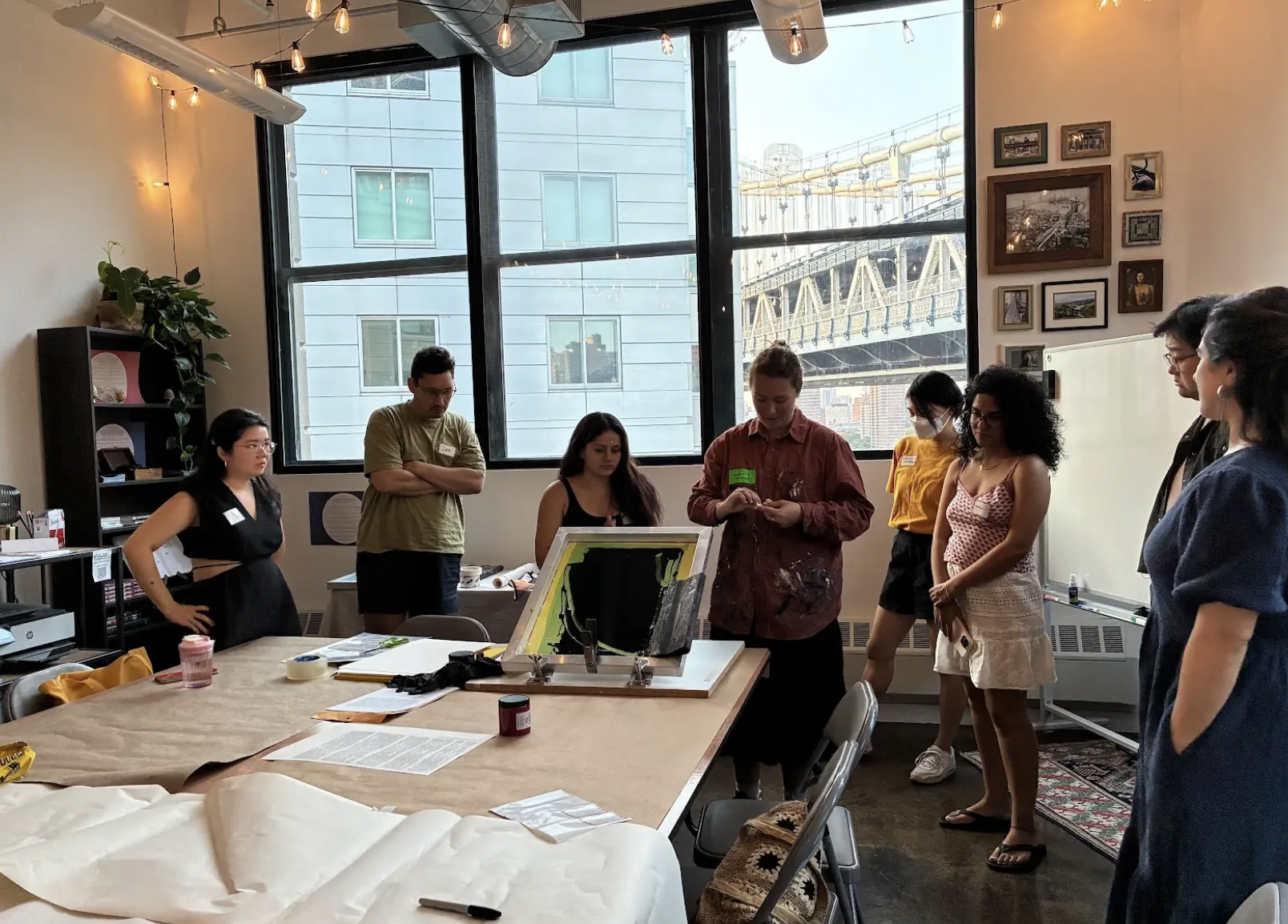
Screenprint Your Own SoRA Merch!
At this open workshop, we will learn the basics of screenprinting and create our own upcycled SoRA merch. Bring whatever you want to revamp - old t-shirts, tote bags, or scrap paper - and we’ll provide various logos and our Attensity! Manifesto to mix and match into your one-of-a-kind design.
We will begin by collectively reading and spending time with the Attensity! Manifesto, which is the crux of SoRA’s movement for attention liberation as well as our upcoming book, Attensity!. Then, we will consider our own personal connection to the different elements of the manifesto by composing our own screenprinted design of the images and text.
This workshop is open to participants with any and all levels of familiarity with printmaking. If you are only available for a portion of this event, we also welcome drop-in visitors to take advantage of the printing station.
Limited blank totes will be provided for purchase!
Led by Francesca Barr, a teaching artist and writer from Massachusetts. She has led art programming at The People’s Forum, Penikese Island School, and other community organizations.
@cesca.barr
![ATTENTION ACTIVISM 201 [ONLINE] (Session 1/3)](https://images.squarespace-cdn.com/content/v1/647e2e2c944dab371f654149/1761762662497-W61R3OUGOX8RUT19IQMR/Untitled+design+%281%29.png)
ATTENTION ACTIVISM 201 [ONLINE] (Session 1/3)
ATTENTION ACTIVISM is the collective movement to push back against the commodification of human attention — what we call "human fracking" — and create, space by community space, a world where we can flourish. In this training, we will explore practical strategies for ATTENTION ACTIVISM, drawing on texts by bell hooks, Paulo Freire, and Deva Woodly. In the 201 training, we will focus on developing the organizing, facilitation, and movement-building skills required to build groups for ATTENTION ACTIVISM. The bulk of the course will be dedicated to supporting participants toward an organizing project in their own communities.
Completion of our Attention Activism 101 seminar is required for participation in our 201 training. Participants who complete Attention Activism 201 will be eligible for inclusion in our national organizing coalition.
Wednesdays, 7-8:45pm EST
December 3, 10, and 17
On Zoom

HOW to FLOURISH (1/3)
In an exploitative economy where our attention is constantly pulled, optimized, and commodified, many of us find ourselves living in survival mode—trying simply to avoid the habits and platforms that leave us drained. But is there a way to move beyond “not doing the bad stuff” and actually flourish in a culture that so often treats our attention as a resource to extract?
This seminar explores flourishing as a practice of attention rather than a goal. Drawing on thinkers like William James, Natasha Dow Schüll, Matthieu Ricard, and Dacher Keltner, as well as the newest psychological research on happiness, we'll look at how habits, technologies, emotions, the body, and the extent of our connection with others and the environment impact our quality of attention and, as a direct result, our quality of life.
We will leave this course with a rich and practical understanding of the psychology of flourishing and happiness, as well as concrete strategies to implement this understanding into our everyday lives.
Led by Maia Pujara, Assistant Professor of Psychology at Sarah Lawrence College.
ENROLL HERE!
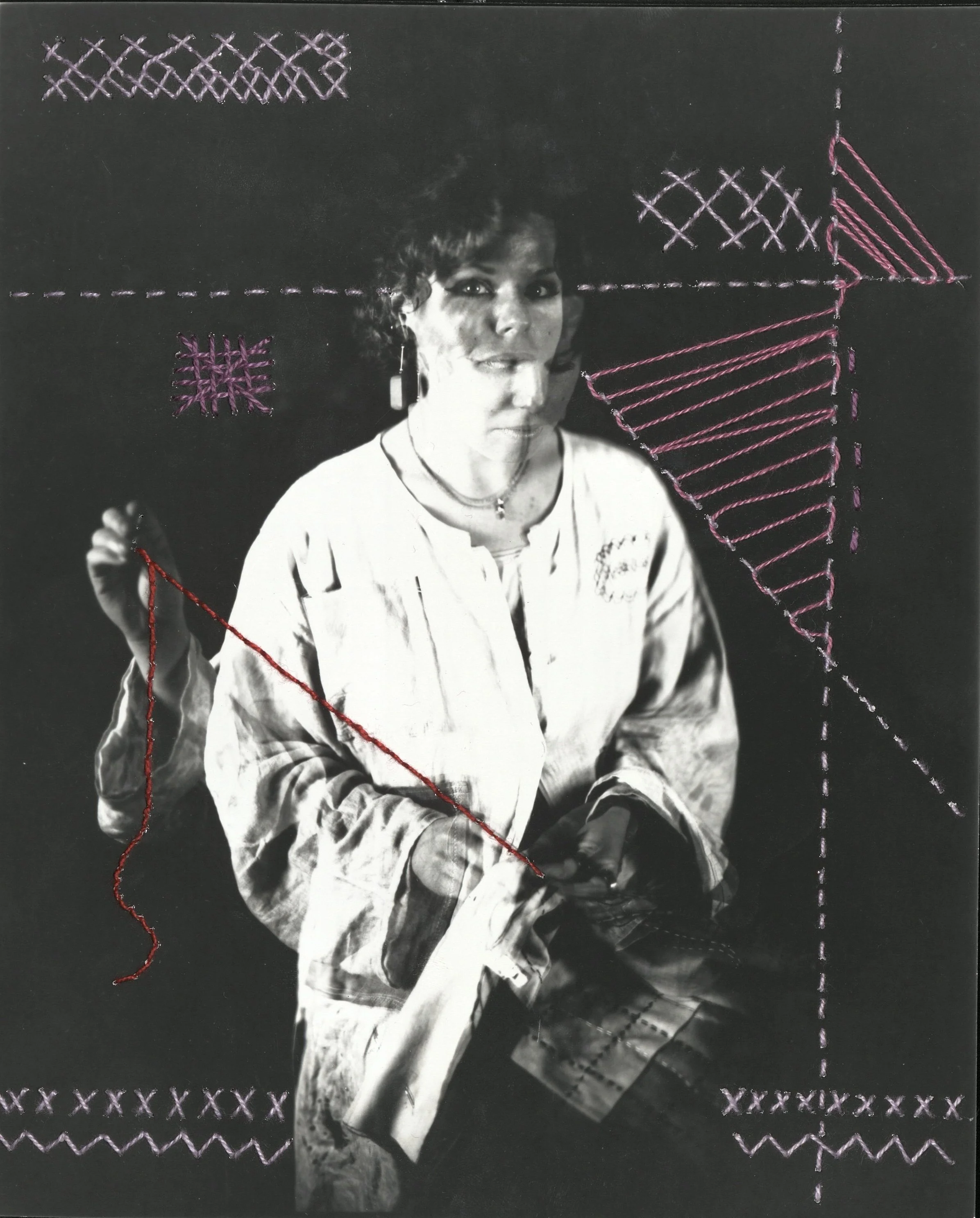
WEAVING ATTENTIONS (3/3)
What is the nature of attention experienced through craft? This course takes as its starting thread the practice of textile creation. These practices are often associated with the creation of utilitarian objects, but in this course, we will explore an alternative utility for craft: its potential as a sanctuary for attention. We will discover how the "patchworked” attention of textile craft can be capaciously attuned to the varying rhythms of our social fabric and consider how to (literally) mend the fracturing of attention.
We will build a collective definition of craft epistemology as we learn (or continue to practice) stitching and weaving skills. We will develop textile techniques in a way that emphasizes the vitality of process over a finished product, consider the labor hidden within the objects around us, and cultivate a flexible form of attention to occupy the lulls where it is most vulnerable to exploitation. By inhabiting the attentional sanctuary that is the stitching circle (in which we will hold a seminar conversation as we work) we will practice an attention that can stretch, knot, fray, and reweave itself—together—without being torn away.
Led by Kathleen Quaintance, textile teacher and PhD candidate in history of art at Yale University.

ATTENTION as PRAYER (2/3)
Mary Oliver once confessed, “I don’t know what a prayer is. I do know how to pay attention.” Are we sure prayer and attention are so different? Simone Weil, the French philosopher and mystic, wrote that prayer is “the orientation of all the attention of which the soul is capable toward God,” and that “the quality of the attention counts for much in the quality of prayer.”
This seminar takes Weil’s challenge seriously. We will exercise attention through the close reading of prayerful writing from the Catholic, Jewish, and Muslim traditions—from the ecstatic Sufi poetry of Rumi and Hafez to the contemplative philosophy of Martin Buber and Franz Kafka. We will attend closely to the language that creates and sustains the pursuit of divine connection through a variety of attentional practices: reading and re-reading, aloud and in silence, repeating sentences like mantras until we glimpse their meaning and, if we are lucky, the deeper experience beneath them. How can attention to texts bring us closer to the divine?
Led by Julia Kornberg, novelist and PhD candidate in Spanish and Portuguese at Princeton University.
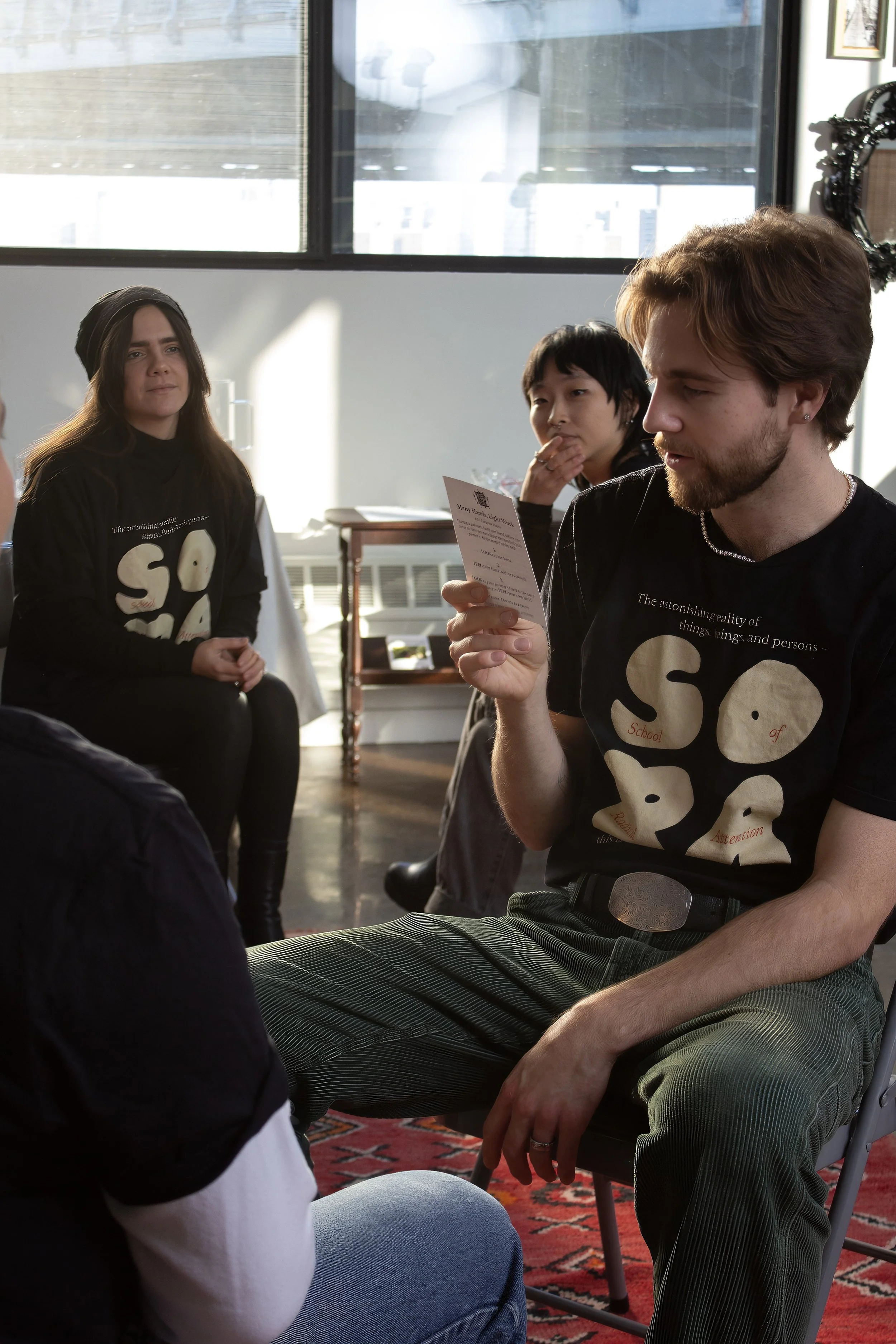
Attention Lab: SANCTUARY
The Attention Labs are an experiential, participatory workshop curriculum dedicated to the joint exploration of radical human attention. Through group attention practices and guided discussions, we create and test tools to build sanctuaries of attention — as well as networks of solidarity to sustain them.
![ATTENTION ACTIVISM 101 [ONLINE] (Session 3/3)](https://images.squarespace-cdn.com/content/v1/647e2e2c944dab371f654149/1755618597294-KS67ESMC7FL8CZIBXMAX/Screenshot+2025-08-19+114824.png)
ATTENTION ACTIVISM 101 [ONLINE] (Session 3/3)
Attention is the touchstone problem of our age. Over the last twenty years, an unprecedented concentration of technical and financial power has successfully monetized human attention. The harms of this new system — in effect, the "fracking" of our most intimate selves — are familiar to all. Less widely understood is the nature of the movement that has emerged to fight back against this historic injustice: ATTENTION ACTIVISM.
In this course, we will survey the intellectual and practical foundations of the nascent ATTENTION ACTIVISM movement. We'll draw on texts by Karl Marx, Guy Debord, Shoshana Zuboff, Tim Wu, and Yves Citton among others. What do the extractive incursions of the Attention Economy mean for shared life in the twenty-first century — and how are communities of activists already working to resist them?

WEAVING ATTENTIONS (2/3)
What is the nature of attention experienced through craft? This course takes as its starting thread the practice of textile creation. These practices are often associated with the creation of utilitarian objects, but in this course, we will explore an alternative utility for craft: its potential as a sanctuary for attention. We will discover how the "patchworked” attention of textile craft can be capaciously attuned to the varying rhythms of our social fabric and consider how to (literally) mend the fracturing of attention.
We will build a collective definition of craft epistemology as we learn (or continue to practice) stitching and weaving skills. We will develop textile techniques in a way that emphasizes the vitality of process over a finished product, consider the labor hidden within the objects around us, and cultivate a flexible form of attention to occupy the lulls where it is most vulnerable to exploitation. By inhabiting the attentional sanctuary that is the stitching circle (in which we will hold a seminar conversation as we work) we will practice an attention that can stretch, knot, fray, and reweave itself—together—without being torn away.
Led by Kathleen Quaintance, textile teacher and PhD candidate in history of art at Yale University.

ATTENTION as PRAYER (1/3)
Mary Oliver once confessed, “I don’t know what a prayer is. I do know how to pay attention.” Are we sure prayer and attention are so different? Simone Weil, the French philosopher and mystic, wrote that prayer is “the orientation of all the attention of which the soul is capable toward God,” and that “the quality of the attention counts for much in the quality of prayer.”
This seminar takes Weil’s challenge seriously. We will exercise attention through the close reading of prayerful writing from the Catholic, Jewish, and Muslim traditions—from the ecstatic Sufi poetry of Rumi and Hafez to the contemplative philosophy of Martin Buber and Franz Kafka. We will attend closely to the language that creates and sustains the pursuit of divine connection through a variety of attentional practices: reading and re-reading, aloud and in silence, repeating sentences like mantras until we glimpse their meaning and, if we are lucky, the deeper experience beneath them. How can attention to texts bring us closer to the divine?
Led by Julia Kornberg, novelist and PhD candidate in Spanish and Portuguese at Princeton University.
ENROLL HERE!
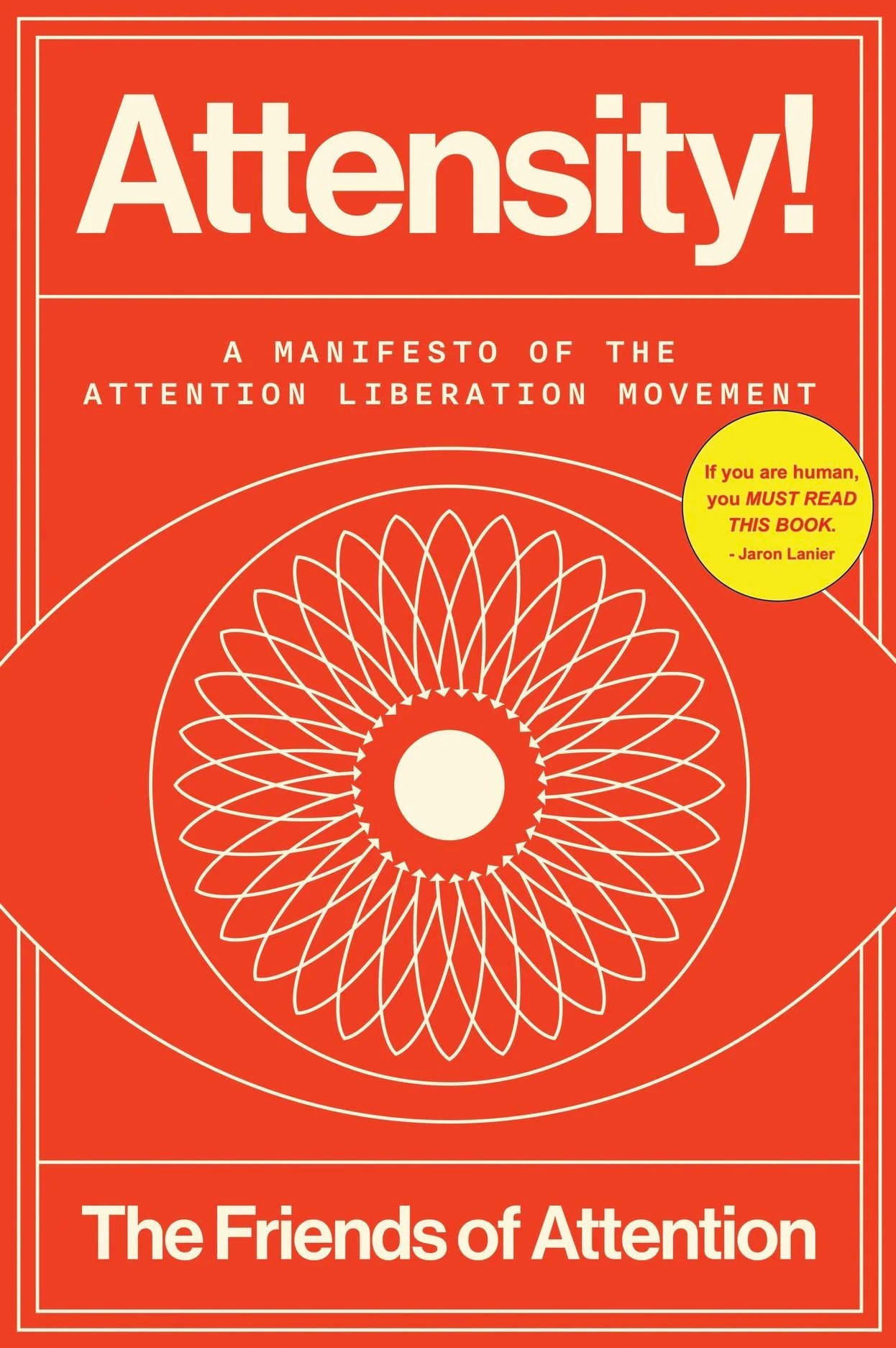
Attensity! Book Talk with D. Graham Burnett, Chris Hayes and Natasha D. Schüll
RSVP HERE!
The Institute for Public Knowledge and the NYU Center for the Humanities will host an event with historian of science D. Graham Burnett on Monday, February 9 (5:30-7:00 PM). Burnett is the co-editor of Attensity! A Manifesto of the Attention Liberation Movement, and he will discuss his work with Chris Hayes and Natasha D. Schüll.
D. Graham Burnett is the Henry Charles Lea Professor of History at Princeton University. His first book, Masters of All They Surveyed: Exploration, Geography, and a British El Dorado (2000), examines the relationship between cartography and colonialism in the nineteenth century. He is also the author of Descartes and the Hyperbolic Quest (2005), A Trial By Jury (2001; Japanese edition 2003), Trying Leviathan: The Nineteenth-Century New York Court Case That Put the Whale on Trial and Challenged the Order of Nature (2007), and The Sounding of the Whale: Science and Cetaceans in the Twentieth Century which came out in 2012. In 2018, he published the co-authored KEYWORDS;…Relevant to Academic Life, &c., and in 2021, he co-authored, and co-edited a work of speculative historiography, In Search of the Third Bird (Strange Attractor, 2021), which represents more than a decade of collaborations with artists and scholars interested in material culture, archival poetics, and the history of “experience.” Twelve Theses on Attention (The Friends of Attention with Princeton University Press, 2021), co-edited with Stevie Knauss, offers an analysis of the politics of “joint attention” in the era of surveillance capitalism. Burnett has written essays and reviews for a variety of publications, including the New Yorker, Harpers, the Economist, the American Scholar (where he served two terms on the editorial board), Daedalus (where he was a contributing editor), the New York Times, the Times Literary Supplement, and the New Republic.
Chris Hayes hosts the Emmy Award-winning “All In with Chris Hayes” on MSNBC, where he is also host of “Why Is This Happening? The Chris Hayes Podcast.” He is also editor-at-large of “The Nation” and author of three New York Times bestsellers: The Sirens’ Call: How Attention Became the World’s Most Endangered Resource (Penguin Random House, 2025) A Colony in a Nation (W.W. Norton & Company, 2017), and Twilight of the Elites: America After Meritocracy (Crown Publishing Group, 2012). Hayes is a former Fellow at Harvard University’s Edmond J. Safra Foundation Center for Ethics. From 2008-2010, he was a Bernard Schwartz Fellow at the New America Foundation. From 2005 to 2006, he was a Schumann Center Writing Fellow at In These Times. Since 2002, Hayes has written on a wide variety of political and social issues, from union organizing and economic democracy, to the intersection of politics and technology. His essays, articles and reviews have appeared in The New York Times Magazine, Time, The Nation, The American Prospect, The New Republic, The Washington Monthly, The Guardian, and The Chicago Reader.
Natasha D. Schüll is a cultural anthropologist and associate professor in the Department of Media, Culture, and Communication at New York University. Her 2012 book, ADDICTION BY DESIGN: Machine Gambling in Las Vegas (Princeton U Press) parses the intimate relationship between the experience of gambling addiction and casino industry design tactics, showing how architectural, atmospheric, ergonomic, audiovisual, and algorithmic-computational techniques are marshalled to suspend—and monetize—gamblers’ attention. Her current book project, KEEPING TRACK (Farrar, Straus, and Giroux, under contract), explores the rise of sensor-based, digital technologies of the self and the new modes of introspection, self-care, and self-regulation they offer. Schüll’s documentary film, BUFFET: All You Can Eat Las Vegas, has screened multiple times on PBS and appeared in numerous film festivals. Her research has been featured in 60 Minutes, The New York Times, The Economist, The Atlantic, The Financial Times, and other outlets.

VESSELS: It’s Never Really Over with John Tsung & Leah Ogawa
Celebrating the launch of Attensity!, the Strother School of Radical Attention (SoRA) holds a series of four participatory events where we will collectively create and test-drive vessels for human attention. Over the course of four weeks, four hosts will activate the Sanctuary Gallery in DUMBO with sound, film, objects and movement, and lecture performance.
Artist duo John Tsung and Leah Ogawa invite us to an evening of slow attention in their interactive installation and performance. Countless strands of white fabric suspended across the space slowly awaken hands, legs, flowers, and other recognizable silhouettes with Leah Ogawa’s puppetry—and steadily dissipate back into a sea of formlessness. John Tsung converses with these movements through music, and will invite attendees to partake in the ensemble through a sound interface that responds to vibrations in the environment.
Image: Leah Ogawa and John Tsung, Divine Generations vol.02, 2023, courtesy of the artists and photographed by Chika Kobari
About the artists
John Tsung (New York, NY) is an interdisciplinary artist, composer, and writer whose works explore migration and myth, particularly the concepts of transmigration and impermanence. Drawing on social practice and sound art, his works often involve emergent sounds and the creation of site-specific performance pieces, influenced by his Buddhist upbringing and classical training. Tsung’s installations and works have been performed in the US and Asia and featured in publications such as BOMB Magazine, Interview, and The New York Times.
Leah Ogawa is an installation artist and puppeteer based in New York City. Raised in Yamanashi, Japan, Leah has worked with puppeteers, artists, and companies including The Metropolitan Opera, La MaMa, Dmitry Krymov, Phantom Limb, Dan Hurlin, Tom Lee, Nami Yamamoto, Loco 7, and others. She has performed across the US as well as at the Quay Branly in Paris and across Asia. Leah is a recipient of the Jim Henson Foundation’s workshop grant for her original piece, Growing Not Dying. Her recent work, Divine Generations with co-creator John Tsung, has been featured in the New York Times.
![ATTENTION ACTIVISM 101 [ONLINE] (Session 2/3)](https://images.squarespace-cdn.com/content/v1/647e2e2c944dab371f654149/1755618597294-KS67ESMC7FL8CZIBXMAX/Screenshot+2025-08-19+114824.png)
ATTENTION ACTIVISM 101 [ONLINE] (Session 2/3)
Attention is the touchstone problem of our age. Over the last twenty years, an unprecedented concentration of technical and financial power has successfully monetized human attention. The harms of this new system — in effect, the "fracking" of our most intimate selves — are familiar to all. Less widely understood is the nature of the movement that has emerged to fight back against this historic injustice: ATTENTION ACTIVISM.
In this course, we will survey the intellectual and practical foundations of the nascent ATTENTION ACTIVISM movement. We'll draw on texts by Karl Marx, Guy Debord, Shoshana Zuboff, Tim Wu, and Yves Citton among others. What do the extractive incursions of the Attention Economy mean for shared life in the twenty-first century — and how are communities of activists already working to resist them?
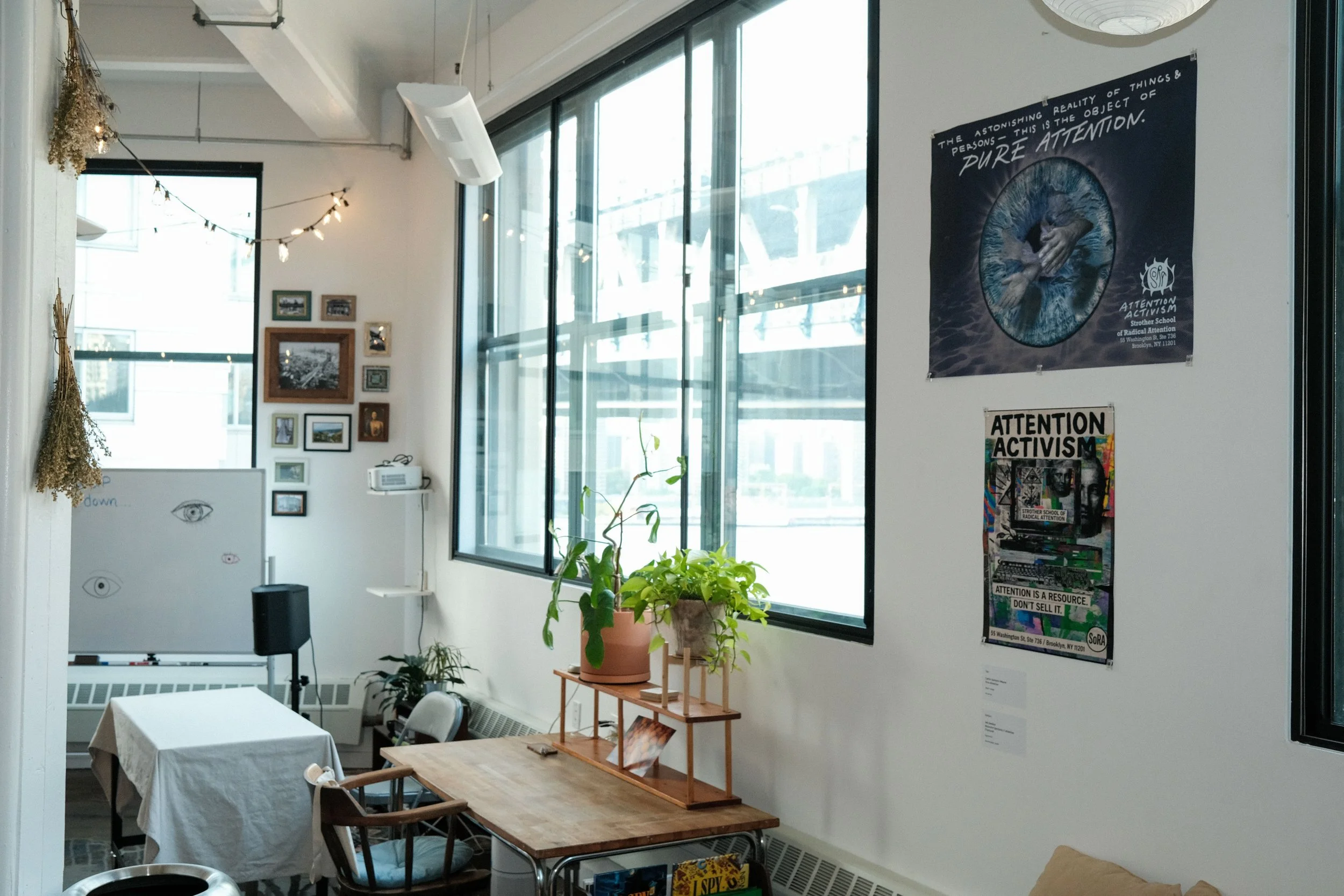
Attention Lab: STUDY
The Attention Labs are an experiential, participatory workshop curriculum dedicated to the joint exploration of radical human attention. Through group attention practices and guided discussions, we create and test tools to build sanctuaries of attention — as well as networks of solidarity to sustain them.

WEAVING ATTENTIONS (1/3)
What is the nature of attention experienced through craft? This course takes as its starting thread the practice of textile creation. These practices are often associated with the creation of utilitarian objects, but in this course, we will explore an alternative utility for craft: its potential as a sanctuary for attention. We will discover how the "patchworked” attention of textile craft can be capaciously attuned to the varying rhythms of our social fabric and consider how to (literally) mend the fracturing of attention.
We will build a collective definition of craft epistemology as we learn (or continue to practice) stitching and weaving skills. We will develop textile techniques in a way that emphasizes the vitality of process over a finished product, consider the labor hidden within the objects around us, and cultivate a flexible form of attention to occupy the lulls where it is most vulnerable to exploitation. By inhabiting the attentional sanctuary that is the stitching circle (in which we will hold a seminar conversation as we work) we will practice an attention that can stretch, knot, fray, and reweave itself—together—without being torn away.
Led by Kathleen Quaintance, textile teacher and PhD candidate in history of art at Yale University.
![ATTENTION ACTIVISM 101 [ONLINE] (Session 1/3)](https://images.squarespace-cdn.com/content/v1/647e2e2c944dab371f654149/1755618597294-KS67ESMC7FL8CZIBXMAX/Screenshot+2025-08-19+114824.png)
ATTENTION ACTIVISM 101 [ONLINE] (Session 1/3)
Attention is the touchstone problem of our age. Over the last twenty years, an unprecedented concentration of technical and financial power has successfully monetized human attention. The harms of this new system — in effect, the "fracking" of our most intimate selves — are familiar to all. Less widely understood is the nature of the movement that has emerged to fight back against this historic injustice: ATTENTION ACTIVISM.
In this course, we will survey the intellectual and practical foundations of the nascent ATTENTION ACTIVISM movement. We'll draw on texts by Karl Marx, Guy Debord, Shoshana Zuboff, Tim Wu, and Yves Citton among others. What do the extractive incursions of the Attention Economy mean for shared life in the twenty-first century — and how are communities of activists already working to resist them?

VESSELS: Ritual of Attention with Park Karo
Celebrating the launch of Attensity!, the Strother School of Radical Attention (SoRA) holds a series of four participatory events where we will collectively create and test-drive vessels for human attention. Over the course of four weeks, four hosts will activate the Sanctuary Gallery in DUMBO with sound, film, objects and movement, and lecture performance.
Is it possible to experience the precise moment when an object opens itself up as a vessel for human attention? In turn, how does the vessel beckon our belief in its efficacy? On January 29, artist Park Karo attempts to unite belief and materiality through performative objects such as “thought-emptying ceramics” and “mirror reflecting sin,” which inspire audience-driven rituals where the independent reality of these objects encounter the thoughts and intentions released by audiences. We will then collectively build a stone tower that rewilds the TV as a technological artifact, as the artist binds each “stone” - made of porcelain - with attendees by inscribing fictional symbols. Through gestures of drawing, stacking, and burning, these ritual objects will gradually alter and become altered by each participant’s inner life.
Image: Park Karo, Thought Emptying Pottery, 2025. Courtesy of the artist.
About the artist
Korean-born artist Park Karo (New York, NY) investigates human systems of belief in the form of installation, painting, text, ceramics, video, music, performance, and tattoos. She is interested in the process where beliefs materialize in various knowledge systems from personal myths to science, and foregrounds the role of objects in orchestrating a relational, performative reality. She has exhibited at Subtitled, New York; SeMA Storage at Seoul Museum of Art, Seoul; Art Space Seogyeo, Seoul; Amado Art Space, Seoul; Alternate Space Loop, Seoul; Humor Garmgot, Seoul; and POST Gallery, Seoul.
![ATTENTION ACTIVISM 201 [ONLINE] (Session 3/3)](https://images.squarespace-cdn.com/content/v1/647e2e2c944dab371f654149/1761762662497-W61R3OUGOX8RUT19IQMR/Untitled+design+%281%29.png)
ATTENTION ACTIVISM 201 [ONLINE] (Session 3/3)
ATTENTION ACTIVISM is the collective movement to push back against the commodification of human attention — what we call "human fracking" — and create, space by community space, a world where we can flourish. In this training, we will explore practical strategies for ATTENTION ACTIVISM, drawing on texts by bell hooks, Paulo Freire, and Deva Woodly. In the 201 training, we will focus on developing the organizing, facilitation, and movement-building skills required to build groups for ATTENTION ACTIVISM. The bulk of the course will be dedicated to supporting participants toward an organizing project in their own communities.
Completion of our Attention Activism 101 seminar is required for participation in our 201 training. Participants who complete Attention Activism 201 will be eligible for inclusion in our national organizing coalition.
Wednesdays, 7-8:45pm EST
December 3, 10, and 17
On Zoom
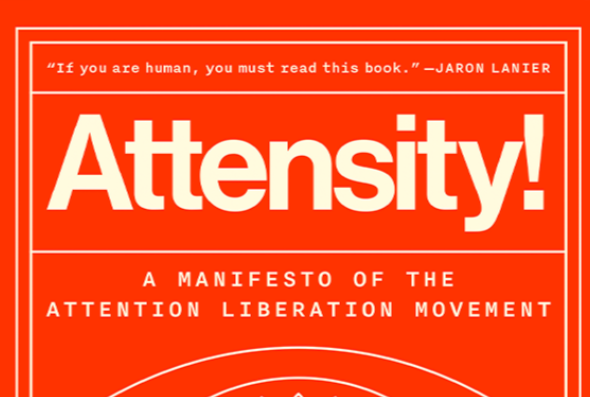
Book Event: The Friends of Attention at SJNY
From the Strother School of Radical Attention and the New York Philosophy Club comes a unique event designed to challenge and inspire! D. Graham Burnett, Alyssa Loh, and Peter Schmidt of the Friends of Attention present their new book, Attensity! A Manifesto of the Attention Liberation Movement, a rallying cry to fight the commodification of human attention and re-enchant the world. Then join the Friends and the NYPC for a participatory and reflective inquiry into the practice and meaning of ATTENTION. The evening will be a chance to feel the power and beauty of shared time, sensory experience, and radical thought.
RSVP HERE!
![ATTENTION ACTIVISM 101 [ONLINE] (Session 3/3)](https://images.squarespace-cdn.com/content/v1/647e2e2c944dab371f654149/1755618597294-KS67ESMC7FL8CZIBXMAX/Screenshot+2025-08-19+114824.png)
ATTENTION ACTIVISM 101 [ONLINE] (Session 3/3)
Attention is the touchstone problem of our age. Over the last twenty years, an unprecedented concentration of technical and financial power has successfully monetized human attention. The harms of this new system — in effect, the "fracking" of our most intimate selves — are familiar to all. Less widely understood is the nature of the movement that has emerged to fight back against this historic injustice: ATTENTION ACTIVISM.
In this course, we will survey the intellectual and practical foundations of the nascent ATTENTION ACTIVISM movement. We'll draw on texts by Karl Marx, Guy Debord, Shoshana Zuboff, Tim Wu, and Yves Citton among others. What do the extractive incursions of the Attention Economy mean for shared life in the twenty-first century — and how are communities of activists already working to resist them?

Attensity! Book Launch and Workshop, featuring D. Graham Burnett, Alyssa Loh, Peter Schmidt
Join D. Graham Burnett, Alyssa Loh, and Peter Schmidt of the Friends of Attention for the launch of their new book, ATTENSITY! A Manifesto of the Attention Liberation Movement (Crown), “a stirring battle cry on behalf of our shared humanity against the forces that seek to diminish and degrade it" (Chris Hayes, author of The Sirens’ Call).
RSVP HERE!
![ATTENTION ACTIVISM 201 [ONLINE] (Session 2/3)](https://images.squarespace-cdn.com/content/v1/647e2e2c944dab371f654149/1761762662497-W61R3OUGOX8RUT19IQMR/Untitled+design+%281%29.png)
ATTENTION ACTIVISM 201 [ONLINE] (Session 2/3)
ATTENTION ACTIVISM is the collective movement to push back against the commodification of human attention — what we call "human fracking" — and create, space by community space, a world where we can flourish. In this training, we will explore practical strategies for ATTENTION ACTIVISM, drawing on texts by bell hooks, Paulo Freire, and Deva Woodly. In the 201 training, we will focus on developing the organizing, facilitation, and movement-building skills required to build groups for ATTENTION ACTIVISM. The bulk of the course will be dedicated to supporting participants toward an organizing project in their own communities.
Completion of our Attention Activism 101 seminar is required for participation in our 201 training. Participants who complete Attention Activism 201 will be eligible for inclusion in our national organizing coalition.
Wednesdays, 7-8:45pm EST
December 3, 10, and 17
On Zoom
![ATTENTION ACTIVISM 101 [ONLINE] (Session 2/3)](https://images.squarespace-cdn.com/content/v1/647e2e2c944dab371f654149/1755618597294-KS67ESMC7FL8CZIBXMAX/Screenshot+2025-08-19+114824.png)
ATTENTION ACTIVISM 101 [ONLINE] (Session 2/3)
Attention is the touchstone problem of our age. Over the last twenty years, an unprecedented concentration of technical and financial power has successfully monetized human attention. The harms of this new system — in effect, the "fracking" of our most intimate selves — are familiar to all. Less widely understood is the nature of the movement that has emerged to fight back against this historic injustice: ATTENTION ACTIVISM.
In this course, we will survey the intellectual and practical foundations of the nascent ATTENTION ACTIVISM movement. We'll draw on texts by Karl Marx, Guy Debord, Shoshana Zuboff, Tim Wu, and Yves Citton among others. What do the extractive incursions of the Attention Economy mean for shared life in the twenty-first century — and how are communities of activists already working to resist them?
![ATTENTION ACTIVISM 201 [ONLINE] (Session 1/3)](https://images.squarespace-cdn.com/content/v1/647e2e2c944dab371f654149/1761762662497-W61R3OUGOX8RUT19IQMR/Untitled+design+%281%29.png)
ATTENTION ACTIVISM 201 [ONLINE] (Session 1/3)
ATTENTION ACTIVISM is the collective movement to push back against the commodification of human attention — what we call "human fracking" — and create, space by community space, a world where we can flourish. In this training, we will explore practical strategies for ATTENTION ACTIVISM, drawing on texts by bell hooks, Paulo Freire, and Deva Woodly. In the 201 training, we will focus on developing the organizing, facilitation, and movement-building skills required to build groups for ATTENTION ACTIVISM. The bulk of the course will be dedicated to supporting participants toward an organizing project in their own communities.
Completion of our Attention Activism 101 seminar is required for participation in our 201 training. Participants who complete Attention Activism 201 will be eligible for inclusion in our national organizing coalition.
Wednesdays, 7-8:45pm EST
December 3, 10, and 17
On Zoom
![ATTENTION ACTIVISM 101 [ONLINE] (Session 1/3)](https://images.squarespace-cdn.com/content/v1/647e2e2c944dab371f654149/1755618597294-KS67ESMC7FL8CZIBXMAX/Screenshot+2025-08-19+114824.png)
ATTENTION ACTIVISM 101 [ONLINE] (Session 1/3)
Attention is the touchstone problem of our age. Over the last twenty years, an unprecedented concentration of technical and financial power has successfully monetized human attention. The harms of this new system — in effect, the "fracking" of our most intimate selves — are familiar to all. Less widely understood is the nature of the movement that has emerged to fight back against this historic injustice: ATTENTION ACTIVISM.
In this course, we will survey the intellectual and practical foundations of the nascent ATTENTION ACTIVISM movement. We'll draw on texts by Karl Marx, Guy Debord, Shoshana Zuboff, Tim Wu, and Yves Citton among others. What do the extractive incursions of the Attention Economy mean for shared life in the twenty-first century — and how are communities of activists already working to resist them?

Attention Lab: STUDY
The Attention Labs are an experiential, participatory workshop curriculum dedicated to the joint exploration of radical human attention. Through group attention practices and guided discussions, we create and test tools to build sanctuaries of attention — as well as networks of solidarity to sustain them.
